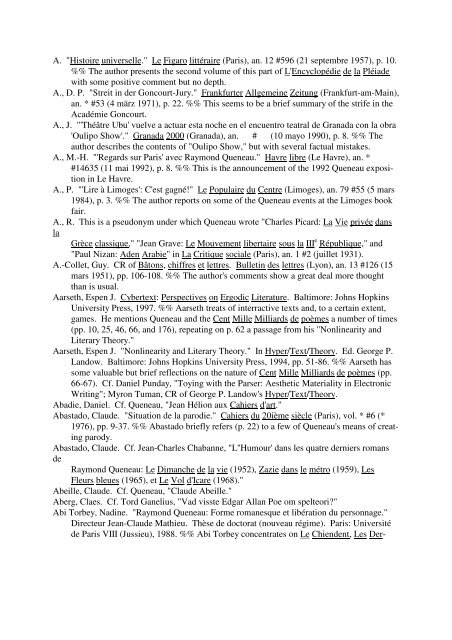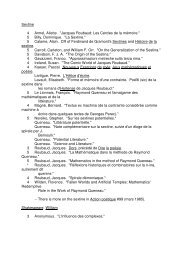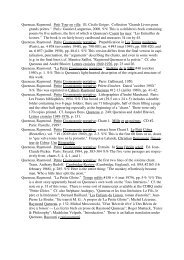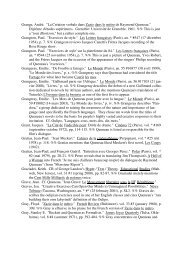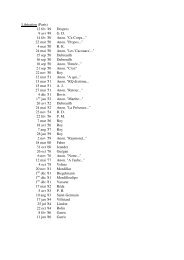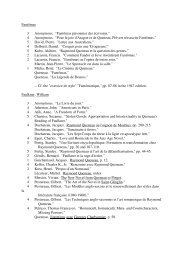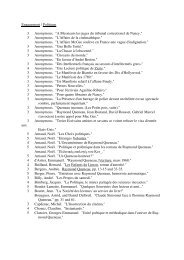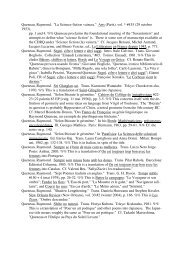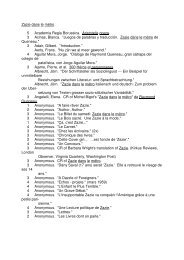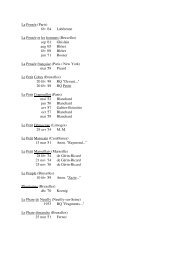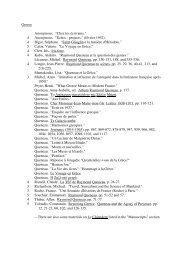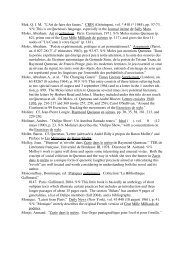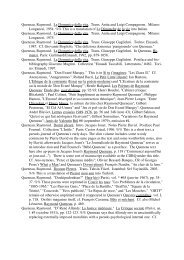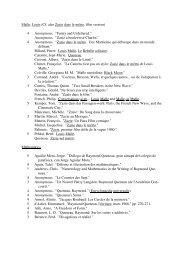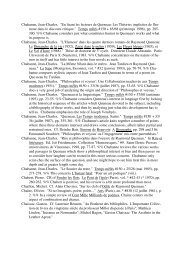A. "Histoire universelle." Le Figaro littéraire (Paris ... - Fonds Queneau
A. "Histoire universelle." Le Figaro littéraire (Paris ... - Fonds Queneau
A. "Histoire universelle." Le Figaro littéraire (Paris ... - Fonds Queneau
- No tags were found...
You also want an ePaper? Increase the reach of your titles
YUMPU automatically turns print PDFs into web optimized ePapers that Google loves.
trées par le héros" ("les conflits socio-politiques"; "pertes de repères pour le personnage";"une possible intégration"), and "l'autre, miroir de ma propre étrangeté" ("la double étrangère";"l'attirance de l'inconnu"; "l'étranger me révèle"). Cf. Daniel Delbreil, "Moissonuniversitaire." [This work is available at the Centre de recherches "L'Esprit nouveau enpoésie"; Institut de littérature française; université de <strong>Paris</strong> III; 13, rue de Santeuil, 75005.It will be necessary to contact Professeur Daniel Delbreil beforehand in order to receiveauthorization.]Aci, Nadia. "<strong>Le</strong> Voyage dans les romans de Raymond <strong>Queneau</strong>." Mémoire de maîtrise. DirecteurDaniel Delbreil. <strong>Paris</strong>: Université de <strong>Paris</strong> III (Sorbonne nouvelle), 2001. %%Aci treats the trip itself (lieux, moyens, motivations), the traveler (l'image du touriste, larepré-sentation de l'étranger, and le voyageur sédentaire), and the value and meaning ofthe trip (le monde fantasmé du voyageur en partance, l'homme n'est qu'un être éphémère,and le voyage comme une renaissance). Cf. Marie-Noëlle Campana, "La Moisson de<strong>Paris</strong> 3 en 2001." [This work is available at the Centre de recherches "L'Esprit nouveauen poésie"; Institut de littérature française; université de <strong>Paris</strong> III; 13, rue de Santeuil,75005. It will be necessary to contact Professeur Daniel Delbreil beforehand in order toreceive autho-rization.]Acinas, Blanca. "Juegos de palabras y traducción. Zazie dans le métro de <strong>Queneau</strong>." In LaTraducción. Metodología / historia / literatura. Ambito hispanofrances. Ed. FranciscoLafarga, Albert Ribas, and Mercedes Tricás. Barcelona: PPU (Promociones y PublicacionesUniversitarias), 1995, pp. 407-414. %% Acinas compares <strong>Queneau</strong>'s French textof Zazie dans le métro to the Sánchez-Dragó translation, Zazie en el metro. She not onlydiscusses some of the particular alterations he made in his trying to be faithful to the originaltext but also makes some suggestions for improvements.Adair, Gilbert. "Introduction." In <strong>Queneau</strong>'s Zazie in the Metro. Trans. Barbara Wright. NewYork: Penguin Books, 2001, pp. vii-xiii. %% Adair reviews <strong>Queneau</strong>'s life and achievements,stressing the cinematic nature of Zazie dans le métro and how well it fits with theimportant films appearing the same year that Zazie was first published.Adair, Gilbert. "A Nation of Punters." The Sunday Times (London), vol. * #8888 (1 january1995), "Books" (Section 7), p. 4. %% Adair merely mentions that <strong>Queneau</strong> used puns "totease and subvert the petrified grandeur of the French language as it had been sanctifiedby the Académie française and contrived to endow them with a whole new set of culturalconnotations."Adair, Gilbert. Cf. Jonathan Bing, "Oulipo Service"; Georges Perec, A Void.Adam, Jean-Michel. "Connecteurs et fonctionnement du poème: A propos d'un quatrain deRaymond <strong>Queneau</strong>." Etudes de lettres (Lausanne), vol. * #1 (janvier-mars 1987), pp. 63-87. %% The quatrain in question is <strong>Le</strong>s Ziaux: "Veille."Adam, Jean-Michel. Eléments de linguistique textuelle: Théorie et pratique de l'analyse textuelle.Liège: Pierre Mardaga, 1990. %% Adam analyzes <strong>Queneau</strong>'s Si tu t'imagines:"Veille" (pp. 37-38 and 227-237). He also mentions <strong>Queneau</strong> on pp. 17-19 and 40.Adam, Jean-Michel. "<strong>Le</strong>s Formes littéraires. <strong>Le</strong>s Structures de l'oeuvre. L'Argumentation."In <strong>Le</strong> Grand Atlas des littératures. Ed. Jacques Bersani. Pref. Jacques Bersani and GillesQuinsat. <strong>Paris</strong>: Encyclopaedia Universalis, 1990, pp. 38-39. %% Adam cites <strong>Le</strong>s Ziaux:"Veille" on p. 39.Adam, Jean-Michel. "Linguistique et littérature: Aspects de la textualité." Bulletin de la
Commissioninteruniversitaire suisse de linguistique appliqué (Neuchâtel), vol. * #48 (octobre1988), pp. 45-65. %% Adam looks at <strong>Le</strong>s Ziaux: "Veille" on pp. 57-65 from a linguisticpoint of view.Adam, Jean-Michel. Pour lire le poème. Fourth edition. <strong>Paris</strong>: De Boeck / Duculot, 1996.%% Adam includes Si tu t'imagines: "L'Explication des métaphores" (pp. 164-165) and"Veille" (pp. 183-184).Adam, Jean-Michel. "Récit." In Dictionnaire des genres et notions littéraires. Ed. RobertAbirached.Préf. François Nourissier and Pierre-Marc de Biasi. <strong>Paris</strong>: Albin Michel, Encyclopédieuniversalis, 1997, pp. 581-585. %% Adam has written a brief analysis of <strong>Queneau</strong>'s"Il faut faire signe au machiniste" (from Courir les rues) as a short example of a"récit."Ades, Dawn. Dada and Surrealism Reviewed. London: Arts Council of Great Britain, 1978.%% Ades has a rather detailed treatment of the early years of surrealism.Ades, Dawn. Cf. José Pierre, ed., Investigating Sex: Surrealist Discussions 1928-1932.Adjedi, Sylvie. "L'Objet usuel dans l'oeuvre romanesque de Raymond <strong>Queneau</strong>." 2 vol. Mémoirede maîtrise. Directrice Claude Debon. <strong>Paris</strong>: Université de <strong>Paris</strong> III (Sorbonnenouvelle), 1990. %% Her chapters concern "l'objet et l'espace," "l'objet et le personnage,"and "l'objet et la réalité de l'existence." [This work is available at the Centre derecherches "L'Esprit nouveau en poésie"; Institut de littérature française; université de<strong>Paris</strong> III; 13, rue de Santeuil, 75005. It will be necessary to contact Professeur DanielDelbreil before-hand in order to receive authorization.]Adler, Laure. Marguerite Duras. <strong>Paris</strong>: Gallimard, 1998. %% Adler describes <strong>Queneau</strong>'s admirationfor Duras and his fidelity to her even as she changed: <strong>Queneau</strong> reads her firstsubmission to Gallimard and judges it negatively, writes a letter of refusal, but when theytalk it is the beginning of a long friendship (pp. 147-149). <strong>Queneau</strong> is a member of theComité national des écrivains early on, helps Duras with another manuscript, but centerson her ability rather than the specific text (pp. 163-165). <strong>Queneau</strong> sees problems with herLa vie tranquille but decides to publish it anyway (p. 213). <strong>Queneau</strong>'s thoughts about theBarrage contre le Pacifique when it is published (pp. 279-281). Duras rejects <strong>Queneau</strong> asher editor because he criticizes her Des Journées entières dans les arbres yet retains himas a friend (p. 303). She includes him in an article without naming him (p. 332).<strong>Queneau</strong> comments on the Barrage film (p. 337). And <strong>Queneau</strong> criticizes her Marin deGibraltar (p. 367). Adler also mentions <strong>Queneau</strong> on pp. 135, 170, 180, 225, 241, 253,284, 286, 304, 314, 323, and 325. Cf. Astrid Bouygues and Bertrand Tassou, "Souvenirsà la pelle."Aerts, Frans. "Nu zijn we al meer gewend." Knack magazine (Bruxelles), an. 13 #43 (26oktober1983), p. 217. %% This is a review of Zazie in de metro.Agan, Giulio Carlo. Cf. Sergio Solmi, "Traduzione da <strong>Queneau</strong>: Petite Cosmogonie portative:Canto I."Agénor. This was an occasional "nom de plume" for André Blavier in Temps mêlés: cf.ClaudeDebon, "André Blavier et Raymond <strong>Queneau</strong>," p. 48; <strong>Queneau</strong> and André Blavier, <strong>Le</strong>ttres
croisées 1949-1976, pp. 223 and 370 (notes 263 and 268); Claude Rameil, "Table desTemps mêlés," p. 183.A_ildere, Suna Timur. "<strong>Le</strong> Problème d'équivalence dans la traduction du langage argotique."Journal of Translation Studies / Revue de traduction et d'interprétation / Çeviribilim veUygulamalari Dergisi (Ankara, Turkey), vol. 8 #* (décembre 1998), pp. 234-247. %%A_ildere uses Zazie dans le métro as her primary source of examples in describing someof the difficulties in finding an exact equivalence between the argot of two different languagesand cultures. She relies on Tahsin Yücel's translation of this novel and on examplesfrom Hergé's Coke en stock, Emile Zola's Germinal, and a novel by the Turkish authorYa_ar Kemal, Ortadirek. This journal is published by Hacettepe University inAnkara. Cf. Tahsin Yücel, "Zazie en Turquie."Aguilar Mora, Jorge. "Diálogo de Raymond <strong>Queneau</strong>, gran sátrapa del colegio de patafísica,con Jorge Aguilar Mora." Siempre (Mexico City), vol. * #1089 (8 mayo 1974), "La Culturaen México," pp. ii-iv. %% Aguilar Mora's apparent mistake here concerning AndréLichnerowicz and <strong>Queneau</strong>'s unusual directness make a good part of his other "citations"from <strong>Queneau</strong> in this "interview" more than a little suspect. Cf. <strong>Queneau</strong>, "Sur les suitess-additives," 1968 version.Aguilar Mora, Jorge. "Raymond <strong>Queneau</strong>: Gran Sátrapa del Colegio de Patafísica." In his LaOtra Francia. Collection "Cuadernos de la Gaceta," #20. Mexico City: Fondo de CulturaEconómica, 1986, pp. 37-50. This is a reprint of his Siempre article.Aguilar Mora, Jorge. Cf. <strong>Queneau</strong>, "Los Enemigos de la luna," Las Flores azules, and Orillas:Matemáticos, precursores, enciclopedistas.Aguilera, María Dolores. "Ou.Li.Po.: La Máquina de la infinita literatura." Quimera (Barcelona),vol. * #15 (enero 1982), pp. 8-11. %% Aguilera gives a popular presentation of theOulipo, but she includes details and some applications to Spanish literature which are noteasily found elsewhere.Aguir, Talel. "Défense et illustration des mathématiques." Directeur Daniel Delbreil.Mémoirede maîtrise de lettres modernes. <strong>Paris</strong>: Université de <strong>Paris</strong> III (Sorbonne nouvelle), 2003.%% Aguir's three principal topics are "les mathématiques queniennes" ("des mathématiquesau sens strict"; "la figure du mathématicien"; "mathématiques et ésotérisme"), "théoriesqueniennes" ("penser les mathématiques"; "mathématiques et littérature"; "maths etéthique"), and "réalisations queniennes" ("structure et écriture"; "<strong>Queneau</strong> et le structuralisme";"<strong>Queneau</strong> et l'Oulipo"). Cf. Daniel Delbreil, "Moisson universitaire." [Thiswork is available at the Centre de recherches "L'Esprit nouveau en poésie"; Institut delittérature française; université de <strong>Paris</strong> III; 13, rue de Santeuil, 75005. It will be necessaryto contact Professeur Daniel Delbreil beforehand in order to receive authorization.]d'Ahetze, J. C. "Style." En Roue libre! Saint-Amand: Imprimerie Bussière, 1947, pp. 165-166. %% This is an "exercice de style" in jargon written by d'Ahetze. It was reprinted inTemps mêlés #150 + 13/14 (août-novembre 1981), pp. 6-7.Ahlenius, Holger. "Jaget och världen." Bonniers Litterära Magasin (Stockholm), vol. 19 #1(january 1950), pp. 35-43. %% This article is in Swedish, and the title means roughly"The Self and the World." Ahlenius reviews Vad Världen ända är liten, C. G. Bjurströmand Maj Odman's Swedish translation of Loin de Rueil. While he likes it, he does notthink that it will be a hit in Sweden.
Aiken, Scott. "Keats, Thou Shouldst Have Stuck Around." International Herald Tribune(<strong>Paris</strong>), an. * #* (28 june 1961), p. 8. %% Aiken gives a rather typical presentation of theoriginal French version of Cent Mille Milliards de poèmes.Ajame, Pierre. "Raymond par-ci, <strong>Queneau</strong> par-là: <strong>Le</strong> Zouave du pont des lettres." NouvelObservateur (<strong>Paris</strong>), an. * #1248 (7 octobre 1988), p. 58. %% This is a fairly serious reviewof Jacques Jouet's Raymond <strong>Queneau</strong>.Ajame, Pierre, et al. 300 Héros et personnages du roman français: D'Atala à Zazie. <strong>Paris</strong>:Balland, 1981. %% This includes entries for Gabriel, Zazie Lalochère, Jacques l'Aumône,Bernard <strong>Le</strong>hameau, and Pierrot.Ajar, Emile. This is a pseudonym for Romain Gary. Cf. Maurice Cagnon, CR of Emile Ajar'sPseudo; Raphaëlle Rérolle, "Ajar alias Gary."van den Akker, Arie. "Het Personage in de Oulipo-romans." Doctoral dissertation. DirectorMaartin van Buuren. Nijmegen: Universiteit Nijmegen, 1987.Alain. Cf. <strong>Queneau</strong>, "Intervention chez les écrivains scientifiques."Alanore, Christiane. Cf. Sylvain France, "<strong>Le</strong>s Arts de Montmartre à Montparnasse"; <strong>Queneau</strong>,"<strong>Le</strong> Cheval troyen"; <strong>Queneau</strong> and André Blavier, <strong>Le</strong>ttres croisées 1949-1976, pp. 53 and348 (note 39).Alauzen, André M. "Gadget littéraire." <strong>Le</strong> Meridional (Marseille), an. 13 #635 (23 juillet1961), p. 5. %% Alauzen gives the usual description of Cent Mille Milliards de poèmesbut with more flair than most.Alazet, Bernard. Cf. Jean-François <strong>Le</strong>coq, "La Fin de l'histoire et le dernier roman. <strong>Le</strong>s Fleursbleues de <strong>Queneau</strong> comme hypertexte."Alba, Victor. "Raymond <strong>Queneau</strong> liberador del lenguaje." Excelsior (Mexico City), an. 40#14073 (15 abril 1956), "Diorama de la cultura," p. 3. %% Alba has a general but verygood description of <strong>Queneau</strong> and his work.Albala, Radu. Cf. <strong>Queneau</strong>, Amicul meu Pierrot.Albani, Paolo. "Accademici informi, patafisici e oulipisti italiani." In Attenzione alpotenziale.Il Gioco della letturatura. Ed. Brunella Eruli. Firenze: Marco Nardi Editore, 1994, pp.125-144. %% Albani reviews the history of some recent marginal (?) literary groups inItaly (Accademia degli Informi, Oulipo, Istituto 'patafisico italiano), with special attentionto the rôle of Il Caffè. He then presents a number of Italian oulipian texts.Albani, Paolo, and Berlinghiero Buonarroti. Dictionnaire des langues imaginaires. Trans.EgidioFesta. <strong>Paris</strong>: <strong>Le</strong>s Belles <strong>Le</strong>ttres, 2001. %% The Italian original was Aga MagéraDifúra: Dizionario delle lingue immaginarie (Bologna: Zanichelli, 1994). The principalentry for <strong>Queneau</strong> (p. 146) describes <strong>Le</strong>s Exercices de style and cites "Javanais" and"Poor Lay Zanglais." The note ends with the statement "Sur le plan linguistique <strong>Queneau</strong>déve-loppe le projet d'une nouvelle langue qu'il appelle «néo-français»" and refers to theentry under this title (pp. 340-341). Other references include "langage des animaux" (pp.42-43), which cites <strong>Queneau</strong>'s "De quelques langages animaux imaginaires et notammentdu langage chien dans Sylvie et Bruno"; Adolphe Bertron (p. 74), who appears in both<strong>Le</strong>s Enfants du Limon and Blavier's <strong>Le</strong>s Fous littéraires; Sébastien-François Drojat (pp.141-142), who is cited in <strong>Le</strong>s Enfants du Limon; "fou littéraire" (p. 175), which gives arather good presentation with details rarely mentioned in the <strong>Queneau</strong> literature; <strong>Le</strong> Quen
d'En-tremeuse (p. 275), cited in <strong>Le</strong>s Enfants du Limon; Harry Mathews (p. 304), in regardto his translation of the "exercice" "Récit" into a French which is malformed in the sameway that <strong>Queneau</strong>'s "Poor Lay Zanglay" is in English; "néo-babélien" (pp. 339-340),which cites a passage from <strong>Le</strong>s Fleurs bleues; Térence-Joseph O'Donnelly (p. 357), citedin <strong>Le</strong>s Enfants du Limon; "langue des Otaries" (p. 365), which cites <strong>Queneau</strong>'s "Dequelques langages animaux imaginaires..."; the Oulipo (p. 366); "parodie des languesétrangères" (pp. 383-384), which just barely mentions <strong>Queneau</strong>; and "pictographie" (pp.398-399), which mentions <strong>Queneau</strong> and includes a copy of the "Récit d'un voyage enautomobile de <strong>Paris</strong> à Cerbère." There is also a mention of <strong>Queneau</strong> under Dubuffet (p.142). Cf. Jean-Baptiste Marongiu, "<strong>Le</strong> Bal des idiomes."Albani, Paolo, and Paolo della Bella. Forse <strong>Queneau</strong>: Enciclopedia delle scienze anomale.Intro. Paolo Rossi. Bologna: Zanichelli, 1999. %% The authors, with the "collaborationof Berlinghiero Buonarroti," have produced a very handy reference books to all sorts ofextravagant thinkers and "sciences." This goes beyond the usual bounds of the "fouslittéraires," then, although it certainly concerns itself with some of the same individualsand topics. Cf. Antonella Conti, "Compte rendu de lecture"; Marco Stuppazoni, CR ofPaolo Albani and Paolo della Bella's Forse <strong>Queneau</strong>: Enciclopedia delle scienze anomale;Mario Verdone, "Forse <strong>Queneau</strong>?"; Renzo Villa, CR of Paolo Albani and Paolo dellaBella's Forse <strong>Queneau</strong>: Enciclopedia delle scienze anomale.Albérès, R.-M. CR of Rejean Ducharme's La Fille de Christophe Colomb. <strong>Le</strong>s Nouvelleslittéraires (<strong>Paris</strong>), an. 47 #2193 (2 octobre 1969), p. 5. %% This review merely mentions<strong>Queneau</strong>'s name. Cf. Rejean Ducharme.Albérès, R. M. "Du côté de l'Orient." <strong>Le</strong>s Nouvelles littéraires (<strong>Paris</strong>), an. 46 #2144 (24 octobre1968), p. 5. %% Albérès suggests that Rejean Ducharme closely approaches <strong>Queneau</strong>'sstyle.Albérès, R.-M. "J. Cruickshank: The Novelist as Philosopher." La Table ronde (<strong>Paris</strong>), vol. *#178 (novembre 1962), pp. 112-114. %% Albérès gives a rather mixed review of JohnCruickshank's work, especially as regards his trying to make "philosophy" cover verydiverse authors in anything but the most superficial manner.Albérès, R.-M. "La Situation de la poésie." <strong>Le</strong> Journal indépendant (Perpignan), an. #(24 juin 1951), p. %% Albérès devotes a few positive words to the Petite Cosmogonieportative.Albersmeier, Franz-Josef. Cf. Sabine Laussman, "Zazie dans le métro: Karnavaleske KomikinRoman und Film."Albert-Birot, Arlette. "Aux Trois matelots: Courseulles, 3 juillet 2003." Amis de ValentinBrû#34-35 (juillet 2004), pp. 133-134. %% Albert-Birot describes an evening in a café on theNorman coast near Caen. During dinner a gifted reader interpreted passages from suchworks as "Panique," "Une Trouille verte," "Cosmophilie" (Texticules), <strong>Le</strong>s Fleurs bleues,and Zazie dans le métro. Cf. also Amis de Valentin Brû #34-35 (juillet 2004), p. 49.Albert-Hesse, Jane. "Héritiers et rebelles." Franc-tireur (<strong>Paris</strong>), an. 10 #1727 (16 février1950), p. 4. %% Albert-Hesse notes "... ou encore dans l'entreprise de Raymond <strong>Queneau</strong>,irrespectueuse du langage traditionnel, et qui met à nu un monde ressenti, ainsi que chezSartre et Camus, comme oppressant et absurde, mais pris par le travers avec une ironie
sans merci."Albertini, Jean. Cf. Marta Giné Janer, CR of Daniel Delbreil's <strong>Le</strong> Personnage dans l'oeuvre de<strong>Queneau</strong>.Albrecht, Jörn. "Der Schriftsteller als Soziolinguist --- Ein Beispiel für unmittelbareBeziehungenzwischen Literatur- und Sprachbetrachtung." In Haben sich Sprach- und Literaturwissenschaftnoch Etwas zu sagen? Collection Abhandlungen zür Sprache und Literatur,#100. Bonn: Romanisticher Verlag, 1998, pp. 13-34. %% Albrecht just uses (pp. 22-23)an exchange between Gabriel and the "gérant" of "<strong>Le</strong> Sphéroïde" (Zazie dans le métro,end of chapter 12) as an example.Albrecht, Jörn. "Zazie dans le métro italienisch und deutsch: Zum Problem der Ubersetzungvon Texten grosser sozio-stilistischer Variabilität." In Europaïsche Mehrsprachigkeit:Festschrift zum 70. Geburtstag von Mario Wandruszka. Ed. Wolfgang Pöckl. Tübingen:Niemeyer, 1981, pp. 311-328.Alcoriza, Luis. Cf. Marie-Claude Cherqui, "'La Mort en ce jardin': L'Ivrogne dans le jungle."Aldebert, Max. "<strong>Le</strong>s Revues." La Nef (<strong>Paris</strong>), an. 3 #16 (mars 1946), pp. 159-160. %% Thishas a couple of mentions of <strong>Queneau</strong> hidden in among other literary things.Alexandre, Maxime. Mémoires d'un surréaliste. <strong>Paris</strong>: La Jeune Parque, 1968. %% Alexandrementions a notebook of <strong>Queneau</strong>'s which Breton lost (pp. 100-101) and how <strong>Queneau</strong> hadtraveled to Austria and Finland right after the war (pp. 216-219). Cf. Jean Chalon, "<strong>Le</strong>sMémoires d'Alexandre."Alexandre, Xavier. "<strong>Queneau</strong>, l'écrivain du XX siècle." Ouest France dimanche (Rennes),an. # (23 juin 2002), p. . %% Alexandre offers only a brief word on <strong>Queneau</strong>to introduce Michel Lécureur's biography of <strong>Queneau</strong> and the second volume of <strong>Le</strong>sOeuvres complètes de Raymond <strong>Queneau</strong>.Alexandrian, Sarane. "L'Aventure surréaliste." In Un Quenal, des <strong>Queneau</strong>. <strong>Paris</strong>: Groupementde libraires "Initiales," 2003, pp. 11-13. %% Alexandrian insists that <strong>Queneau</strong> remaineda surrealist throughout his life and gives what he considers evidence for thisasser-tion. Cf., however, Michel Lécureur, Raymond <strong>Queneau</strong>. Biographie, pp. 125-126.This is number 13 (février 2003) in the series of brochures that 29 "libraires" from acrossFrance put together for their clients.Alexandrian, Sarane. "L'Héritage de <strong>Queneau</strong>." L'Express (<strong>Paris</strong>), vol. * #1321 (1 ier novembre1976), pp. 84-85. %% This is an extremely general and weak article following <strong>Queneau</strong>'sdeath. Alexandrian includes Exercices de style: "Notations," "En partie double,""Métaphoriquement," "Exclamations," "Ampoulé," "Olfactif," "Ensembliste,""Botanique," "Injurieux," "Paysan," "Interjections," and "Précieux" on pp. 85-87 of thisissue.Alexandrian, Sarane. "L'Héritage de <strong>Queneau</strong>." L'Express (<strong>Paris</strong>), international edition vol. *#1321 (1 ier novembre 1976), pp. 28-29.Alexandrian, Sarane. <strong>Histoire</strong> de la littérature érotique. <strong>Paris</strong>: Seghers, 1989. %%Alexandriangives some details about the publication of On est toujours trop bon avec les femmes.Alexandrian, Sarane. "<strong>Le</strong>s Structures de l'imaginaire chez Raymond <strong>Queneau</strong>." In <strong>Le</strong> Surréalismeet le rêve. Pref. J.-B. Pontalis. <strong>Paris</strong>: Gallimard, 1974, pp. 421-442. %% Alexandrianis primarily interested in <strong>Queneau</strong>'s surrealist years but also considers some of his
later works in a surrealist light. Cf. Michal Mrozowicki, "D'un 'Récit de rêve' à 'Des Récitsde rêve à foison' --- <strong>Le</strong>s Ecrits brefs en prose de Raymond <strong>Queneau</strong>"; Carol J. Murphy,CR of Sarane Alexandrian's <strong>Le</strong> Surréalisme et le rêve.Alexandru, Laszlo. Cf. <strong>Queneau</strong>, Sintem mereu prea buni cu femeile and Zazie în metrou.Alfau, Felipe. Cf. Tom Whalen, "Felipe Alfau's 'Kaleidoscope of Fancies'."Algren, Nelson. Cf. Simone de Beauvoir, <strong>Le</strong>ttres à Nelson Algren: Un Amour transatlantique(1947 - 1964).<strong>Le</strong>s Alguazils. "Aux Quatre Vents." <strong>Le</strong> <strong>Figaro</strong> littéraire (<strong>Paris</strong>), an. 5 #221 (15 juillet 1950),p.2. %% The author gives a very positive review of the section of Petite Cosmogonie portativewhich had recently appeared in <strong>Le</strong>s Temps modernes, although he concentrates onthe reaction to the publication of poetry in such a magazine. Cf. <strong>Queneau</strong>, Cher Monsieur-Jean-Marie-monfils: <strong>Le</strong>ttres 1938-1971, p. 86.<strong>Le</strong>s Alguazils. "Aux Quatre Vents." <strong>Le</strong> <strong>Figaro</strong> littéraire (<strong>Paris</strong>), an. 5 #225 (12 août 1950), p.3. %% The author indicates that <strong>Queneau</strong> would appear in a film that Louis-René desForêts planned to create; <strong>Queneau</strong> would be fishing in a river. The note goes on to saythat des Forêts had had to abandon the project. Cf. Antoine de Gaudemar, "'Je n'avanceque dans l'obscurité'"; <strong>Queneau</strong>, Cher Monsieur-Jean-Marie-mon fils: <strong>Le</strong>ttres 1938-1971,pp. 96-98.<strong>Le</strong>s Alguazils. "Jeudi, rue Sébastien-Bottin." <strong>Le</strong> <strong>Figaro</strong> littéraire (<strong>Paris</strong>), an. 4 #161 (21 mai1949), p. 2. %% This is merely an anecdote containing a "bon mot" of <strong>Queneau</strong>: "le muséede l'art brut" (a reference to Dubuffet).Ali Ahmed, Azouz. "Savoirs, création et désenchantement chez <strong>Queneau</strong>, précédé de 'Mirageblanc'." Thèse. Montréal: Université de Montréal, 2005.Alion, Yves, and Gilles Cèbes. "Entretien." Ecran 77 (<strong>Paris</strong>), vol. * #62 (15 octobre 1977),pp. 14-21. %% This interview with Jean-Pierre Marielle just mentions the film version ofSally Mara's On est toujours trop bon avec les femmes.Alkire, Elbern H., III. "Equivalence in Difference: <strong>Queneau</strong>'s <strong>Le</strong>s Exercices de style in French,English, and Italian." PhD at Cornell University (Ithaca, New York), 2000. DirectressLinda R. Waugh. Dissertation Abstracts International, vol. 61 #6A (* 2000), p. 2321.%% Alkire considers how translation and the differences in meaning that are incurredduring translation do not really affect the equivalence of the two texts. His primary interestis in the nature and limits of translation, and <strong>Queneau</strong>'s <strong>Le</strong>s Exercices de style onlyserves as a concrete referent. He limits himself to "Homophonique," "Vulgaire," "Lipogramme,"and "Translation" (from the revised edition) as they appear in the originalFrench and in Barbara Wright's translation, Exercises in Style, and Umberto Eco's Esercisidi stile.Allais, Alphonse. Cf. Anonymous, "<strong>Le</strong> Monde potine: L'Echo répète"; André Billy, "<strong>Queneau</strong>ou le français populaire tel qu'on le parle"; Jacques Brenner, "<strong>Le</strong> Sourire d'Alphonse Allais";Jean Datain, "Aspects du comique de sonorité"; Jean-Marc Defays, "Enjeux et stratégiesdu discours dans l'oeuvre d'Aphonse Allais"; Jeanne Demers, "'Pataphysique appliquée:<strong>Le</strong> Cas Alphonse Allais"; Jean-Paul Lacroix, Allais-France; <strong>Queneau</strong>, "Message";<strong>Queneau</strong> and André Blavier, <strong>Le</strong>ttres croisées 1949-1976, pp. 145 and 363 (note 192);Henri Rochon, "Je médis comme on me l'a dit."Allan, Alexander. "Waugh Revisited." Etudes anglaises (<strong>Paris</strong>), vol. 33 #3 (juillet-septembre
1980), pp. 321-332. %% There is just a reference to <strong>Le</strong> Chiendent and Loin de Rueil in anote on p. 322.Allard, Paul. Cf. <strong>Queneau</strong>, "Marcel Berger et Paul Allard: <strong>Le</strong>s Secrets de la censure pendant laguerre."Allaud, Gilles. Cf. Gérard Mordillat, Célébrités poldèves.Alleman, Marcel. Cf. D. Pappo Gruffat, "Deux Mineurs de fond seront-ils au CNE le 30 octobre?"Allen, Bruce. CR of Barbara Wright's translation of The Flight of Icarus. Library Journal(New York), vol. 99 #3 (1 february 1974), p. 383. %% This is a short and fairly standardreview.Allen, Douglas. "Eliade and History." Journal of Religion (Chicago), vol. 68 #4 (october1988), pp. 545-565. %% Allen merely cites <strong>Queneau</strong> in note 44 as the editor of the <strong>Histoire</strong>des littératures. Cf. <strong>Queneau</strong>, "<strong>Le</strong>ttre à Mircea Eliade."Allen, L. Cf. S. F. Hawes, "<strong>Queneau</strong>. A Study of Technique in Fiction."Allen, Suzanne. "Livres/lèvres." Temps mêlés #150 + 65/68 (printemps 1996), pp. 301-320.%% It would be difficult to say precisely what this is about, but Allen seems to be writingon some poorly-defined ideas of what <strong>Queneau</strong>'s theory of poetry was.Allen, Suzanne. "Sans titre ou à titre de témoin." Temps mêlés #150 + 57/60 (automne 1993),pp. 224-230. %% Allen writes exclusively of the Oupeinpo (Ouvroir de Peinture potentielle)and some of its members, following the contribution of Thieri Foulc to this sessionof the second Thionville symposium, "<strong>Queneau</strong> peintre."Allendy, D r René. Cf. Jacques Poirier, Littérature et psychanalyse: <strong>Le</strong>s Ecrivains français faceau freudisme (1914-1944); <strong>Queneau</strong>, "D r René Allendy: La Justice intérieure" and "D rRené Allendy: La Psychanalyse, doctrines et applications."Alliot, Bernard. "A. D. G. n'aime pas Alain Fournier." <strong>Le</strong> Monde (<strong>Paris</strong>), an. 38 #11443 (13novembre 1981), p. 29. %% Alliot refers to <strong>Queneau</strong> as an "auteur familier de la supercherielittéraire."Allouche, Jean-Pierre. "How New is Technological Art?" <strong>Le</strong>onardo (Cambridge, Massachusetts),vol. 32 #4 (* 1999), p. 303. %% Allouche just mentions the Oulipo and <strong>Queneau</strong>'sCent Mille Milliards de poèmes.Alluin, Bernard. Cf. Véronique Bartoli, "<strong>Le</strong>s Fleurs bleues: Roman et histoire"; Mary-LiseBillot, "D'une modalité de progression romanesque dans <strong>Le</strong>s Fleurs bleues"; Claude Debon,"<strong>Le</strong> Statut de la nouvelle dans l'oeuvre de <strong>Queneau</strong>," "<strong>Queneau</strong> en Pléiade," and "LaRécriture dans <strong>Le</strong>s Fleurs bleues"; Anne-Yvonne Dubosclard, "Du côté de chez Cidrolinou '<strong>Le</strong>s menus incidents de la vie éveillée'"; Jeanyves Guérin, "<strong>Queneau</strong> poète de romanface au Nouveau Roman"; Christian Meurillon, "Exercice d'anoulipisme: QuelquesRègles de syntaxe des Fleurs bleues"; Gilbert Pestureau, "<strong>Le</strong> Double Protagoniste:Cidauge"; Claude Rameil, "Bibliographie des Fleurs bleues"; and Paul Renard, "<strong>Le</strong>Passant et le clergyman."Almansi, Guido. "Perec: Guardare a occhi chiusi." In Attenzione al potenziale. Il Gioco dellaletturatura. Ed. Brunella Eruli. Firenze: Marco Nardi Editore, 1994, pp. 121-124. %%This appears to be little more than a panegyric of Perec and his work.Almansi, Guido, and Guido Fink. "Esercizi di stile." In their Quasi come. Milano: Bompiani,1976, pp. 290-299. %% This consists of the translation into Italian of the "exercices destyle" "Notations," "Métaphoriquement," "Rétrograde," "Rêve," "Animisme," "<strong>Le</strong>ttre of-
ficielle," "Insistance," "Ignorance," "Moi je," "Exclamations," "Fantomatique," "Apostrophe,""Réactionnaire," "Contre-vérités," "Latin de cuisine," and "Interjections" followedby a brief discussion.Alocco Bianco, Luciana. "<strong>Queneau</strong> e Ajar: Scrittori contro." In Studi di linguistica, Storia dela lingua, Filologia francesi. Convegno della Società Universitaria per gli Studi di Linguae <strong>Le</strong>tteratura francese, Torino 16-17 giugno 1994. Ed. Mariagrazia Margarito and AnnaMaria Raugei. Alessandria: Edizioni dell'Orso, 1995, pp. 247-257. %% Alocco Biancoconsiders "unconventional French" in the earlier chapters of <strong>Queneau</strong>'s Zazie dans lemétro and, to a far lesser extent, in Romain Gary's La Vie devant soi. There is little newor inte-resting here.Alonso, Salvador. "'Oulipo Show,' la segunda obra del 'Theatre Ubu' en el certamen de Granada:El <strong>Le</strong>nguaje como espectáculo." Granada 2000 (Granada), an. # (12 mayo1990), p. 8. %% This is a rather general presentation of the "Oulipo Show" and its contents.Altagor. Cf. Amis de Valentin Brû #14-15 (mai 1999), pp. 73-74.Altarriba, Antonio. "La Constricción española." In Sobre literatura potencial. Actos del encuentrosobre literatura potencial, Vitoria, del 2 al 6 de diciembre de 1985. Ed. AntonioAltarriba. Vitoria: Universidad del país vasco, 1987, pp. 155-159. %% Altarriba looks atwhat S + 7 does and can do in Spanish.Altarriba, Antonio. "Introducción." In Sobre literatura potencial. Actos del encuentro sobreliteratura potencial, Vitoria, del 2 al 6 de diciembre de 1985. Ed. Antonio Altarriba.Vitoria: Universidad del país vasco, 1987, pp. 5-6. %% This is only a generalintroduction to this volume.Altarriba, Antonio. "Sobre la función parodica y otras atribuciones de la literatura potencial."Queste (Pau), an. * #3 (* 1986), pp. 81-93. %% Altarriba concentrates on this one particularaspect of the Oulipo and only mentions <strong>Queneau</strong> offhandedly once.Altarriba, Antonio, ed. Sobre literatura potencial. Actos del encuentro sobre literatura potencial,Vitoria, del 2 al 6 de diciembre de 1985. Vitoria: Universidad del país vasco, 1987.%% This volume contains works by Antonio Altarriba, Eric Beaumatin, Marcel Bénabou,Jean Bessière, Jesús Camerero, Jacques Jouet, Bernard Magné, Harry Mathews, JavierMina, and Jacques Roubaud.Altarriba, Antonio, and Luis Royo. "El Puerto de Gijon, modo de empleo." In Sobre literaturapotencial. Actos del encuentro sobre literatura potencial, Vitoria, del 2 al 6 de diciembrede 1985. Ed. Antonio Altarriba. Vitoria: Universidad del país vasco, 1987, pp. 123-148.%% Altarriba looks at the hobby of Bartlebooth (Georges Perec, La Vie mode d'emploi)and how it functions; Royo supplied the illustrations.Alter, André. "Raymond <strong>Queneau</strong> fait confiance à M. Yoyotte et à beaucoup d'autres." <strong>Le</strong><strong>Figaro</strong> (<strong>Paris</strong>), an. 113 #3560 (16 février 1956), p. 11. %% This concerns a Gallimardcocktail party celebrating the publishing of the first volume of the Encyclopédie de laPléiade.Alter, André. "Théâtre." Témoignage chrétien (<strong>Paris</strong>), vol. * #906 (17 novembre 1961), pp.21 and 23. %% Alter does not care for the theater version of Loin de Rueil and is not surewhy.Alter, Jean V. CR of Andrée Bergens' Raymond <strong>Queneau</strong>. French Review (Baltimore), vol.39
#2 (november 1965), pp. 326-327. %% Alter's review is not exactly negative but doespoint out a number of weaknesses in Bergens' text.Alter, Jean V. CR of Henri Peyre's French Novelists of Today. French Review (Baltimore),vol. 42 #1 (october 1968), pp. 171-173. %% Alter reviews what is essentially a revisededition of Peyre's Contemporary French Novel. He finds that "le traitement de <strong>Queneau</strong>reste aussi insuffisant qu'il l'était."Alter, Robert. Partial Magic: The Novel as a Self-conscious Genre. Berkeley: University ofCalifornia Press, 1975. %% Alter has almost exactly reproduced his "Self-conscious Moment"article in this book; the pages relevant to <strong>Queneau</strong> are 220-223 and 232-235. Alteralso refers to <strong>Queneau</strong> on page 22.Alter, Robert. "Mimesis and the Motive for Fiction." In Images and Ideas in American Culture:The Functions of Criticism. Ed. Arthur Edelstein. Hanover, New Hampshire: UniversityPress of New England, 1979, pp. 99-123. %% Alter refers to <strong>Queneau</strong>'s Exercicesde style (p. 117), but only to say that Manuel Puig's stylistic variations in The BuenosAires Affair are not similar to <strong>Queneau</strong>'s.Alter, Robert. "Mimesis and the Motive for Fiction." In his Motives for Fiction. Cambridge,Massachusetts: Harvard University Press, 1984, pp. 3-21. %% This is virtually the sametext as the original.Alter, Robert. "The Self-conscious Moment: Reflections on the Aftermath of Modernism."Tri-Quarterly (Champaign, Illinois), vol. * #33 (spring 1975), pp. 209-230. %% Pages211-212 and 220-222 discuss the importance of Exercices de style and <strong>Le</strong> Chiendent inmodern literature.Alter, Robert. Cf. Thomas Francesco Petruso, "Characterization in the Novel Since Proust andJoyce."Althusser, Louis. CR of Alexandre Kojève's Introduction à la lecture de Hegel. Cahiers duSud (Marseille), an. 34 #286 (* 1947), pp. 1057-1059. %% Althusser reviews Hegel'sthought and notes the particular interpretation which Kojève puts on it, all without mentioning<strong>Queneau</strong>.Altman, Thierry, and Michel Paquot. "Jacques Roubaud: 'Nous n'avons pas terminé 53Jours'." La Cité (Bruxelles), an. 2 #42 (19 octobre 1989), p. 65. %% The authors interviewRoubaud, who edited, along with Harry Mathews, Georges Perec's unfinished 53Jours.Alwyn, William. Cf. <strong>Queneau</strong>, "Four Poems" and "Poems."Alyn, Marc. "La Poésie en 1969: Une Année couleur de muraille." <strong>Le</strong>s Nouvelles littéraires(<strong>Paris</strong>), an. 48 #2207 (8 janvier 1970), p. 7. %% Alyn just barely mentions Fendre lesflots.Άµαvίτης, Νίκoς. Cf. <strong>Queneau</strong>, "Ηvα Παραµυθι στα µετρα σας."Ambrière, Francis. "Raymond <strong>Queneau</strong> à l'Académie Goncourt." Revue de <strong>Paris</strong> (<strong>Paris</strong>), an.58 #* (avril 1951), pp. 169-170. %% Ambrière discusses possible reasons for <strong>Queneau</strong>'selection as well as possible effects; it is quite an interesting article.Ambrière, François. "Revue des revues." Toute l'Edition (<strong>Paris</strong>), an. 17 #454 (4 février 1939),p. 10. %% In considering Volontés #13, Ambrière cites with approval <strong>Queneau</strong>'s "<strong>Le</strong>sHorizons perdus" on the sad state of contemporary poetry.Ambrière, Francis. "Savoir sourire." La Bataille (<strong>Paris</strong>), an. 6 #123 (30 avril 1947), p. 6. %%He just mentions <strong>Queneau</strong>'s Exercices de style.
Ambrière, Francis. "'La Vie que je t'ai donnée' au Théâtre Agnès Capri." Opéra (<strong>Paris</strong>), an. 4#101 (16 avril 1947), p. 3. %% Ambrière finds "En passant" rather flat.Amiot, Anne-Marie. Cf. Marcel Bourdette-Donon, "Raymond <strong>Queneau</strong>, une stratégie de communication."Amis de Valentin Brû. For this oranization and the periodical which bears the same name, cf.Astrid Bouygues and Daniel Delbreil, "Claude Simonnet face à l'oeuvre de RaymondQue-neau," p. 79.Ammour, Ophélie. "L'Echec dans la production romanesque de Raymond <strong>Queneau</strong>."Mémoirede maîtrise. Directeur Daniel Delbreil. <strong>Paris</strong>: Université de <strong>Paris</strong> III (Sorbonnenouvelle), 2006. %% [This work is available at the Centre de recherches "L'Espritnouveau en poé-sie"; Institut de littérature française; université de <strong>Paris</strong> III; 13, rue deSanteuil, 75005. It will be necessary to contact Professeur Daniel Delbreil beforehand inorder to receive au-thorization.]Amphitryon. "Madame Bovary exagère." <strong>Paris</strong>-presse (<strong>Paris</strong>), an. * #* (17 mars 1952), p. 2D.%% <strong>Queneau</strong> jokes about Aragon being the "travailleur de l'Amer," a pun on VictorHugo's title.Amphitryon. "<strong>Queneau</strong> est cruel." <strong>Paris</strong>-presse (<strong>Paris</strong>), an. * #* (22 janvier 1952), p. 2C. %%<strong>Queneau</strong> tells the story of a blind man who accidentally blinds a "borgne" and how thelatter got his revenge.Amphitryon. "<strong>Queneau</strong> offre un autre zouave à la N.R.F." <strong>Paris</strong>-presse (<strong>Paris</strong>), vol. * #* (17janvier 1952), p. 2C. %% This is a brief mention of the appearance of <strong>Le</strong> Dimanche de lavie, with special attention to the "Hain-Tenys."Amrouche, Jean. "Mal du siècle 1944." <strong>Le</strong>s Elites françaises (Orléans), vol. 1 #1 (avril-mai1945), p. 39. %% Amrouche's review of Loin de Rueil is more of a postwar social commentarythan literary criticism.Amunategui, Francisco. "Französische Romane." <strong>Paris</strong>er Tageszeitung (<strong>Paris</strong>), an. 1 #139 (28oktober 1936), p. 4. %% Amunategui reviews <strong>Le</strong>s Derniers Jours and two other novels.Amunategui, Francisco. "<strong>Le</strong>s Livres: Romans des temps difficiles." La Vie réelle (<strong>Paris</strong>), an.*#2 (octobre 1937), pp. 61-65. %% This review of Odile is very good, although in a differentvein than is usual.Anbert, Camille. "Vient de paraître." Temps présent (<strong>Paris</strong>), an. 9 #34 (13 avril 1945), p. 3.%% A rather average short review of Loin de Rueil.André. "Negerblod och löss." Morgon-Tidningen (Stockholm), an. * #348 (23 december1949), p. 6. %% The author gives an ambiguous to warm reception to Var Världen ändaär liten (which means "How Small the World is"), C. G. Bjurström and Maj Odman'stranslation of Loin de Rueil into Swedish.André, Alex. Ils en racontent de drôles. <strong>Paris</strong>: Plon, 1963. %% <strong>Queneau</strong> notes (p. 182) thatthe public clocks and scales in <strong>Paris</strong> do not agree much at all... Alex André is the pseudonymof André de Coudekerque-Lambrecht.André, Paul. "Un Discours encyclopédique." Présence (Genève), an. 6 #2 (printemps 1956),pp. 111-114. %% André discusses the value of the new Encyclopédie de la Pléiade.André, Robert. "En font-ils de la musique?" Nouvelle Revue française (<strong>Paris</strong>), an. 10 #117(septembre 1962), pp. 558-559. %% André just mentions the Cent Mille Milliards de
poèmes.Andress, Josette. Cf. <strong>Queneau</strong>, Pierrot mon ami.Andreus, Hans. "Gesprek met Raymond <strong>Queneau</strong>." Litterair Paspoort (Amsterdam), an. 8 #67(mei-juni 1953), pp. 114-115.Andreus, Hans. "Gesprek met Raymond <strong>Queneau</strong>." In Litterair paspoort 1946-1973. Ed. JanVan Geelen. Amsterdam: Uitgeverij de Arbeiderspers, 1975, pp. 12-16.Andreus, Hans. "Onze Correspondent meldt." Litterair Paspoort (Amsterdam), an. 8 #63(januari 1953), pp. 18-19. %% Andreus takes a quick look at Saint-Glinglin.Andrews, Chris. "Constraint and Convention: The Formalism of the Oulipo." Neophilologus(Amsterdam), vol. 87 #2 (april 2003), pp. 223-232. %% In developing his argument, Andrewscomments (p. 225) on Roubaud's "La Mathématique dans la méthode de Raymond<strong>Queneau</strong>."Andrews, Chris. "L'Evolution des machines dans la Petite Cosmogonie portative de Raymond<strong>Queneau</strong>." Australian Journal of French Studies (Clayton, Victoria), vol. 40 #1-2(january 2003), pp. 180-193. %% Andrews examines the role of machines in the sixthcanto of the Petite Cosmogonie portative and comes up with some unexpectedconclusions.Andrews, Chris. “Hide and Seek: Autobiographical Secrets in the Work of <strong>Queneau</strong> and Perec.”In Soi-disant: Life-writing in French. Ed. and intro. Juliana de Nooy, Joe Hardwick,and Barbara E. Hanna. Collection “Monash Romance Studies.“ Newark,Delaware: University of Delaware Press, 2005, pp. 12-25. %% Andrews investigates howwritings from <strong>Queneau</strong> and Perec which were generally available only after their deathsreveal a deeper meaning for various of their works, such as Chêne et chien, Fendre lesflots, W, and La Vie mode d'emploi. The majority of the papers found in this volumewere present-ed at the 11th annual conference of the Australian Society for FrenchStudies (July 2003, in Brisbane and Ipswich, Queensland).Andrews, Chris. "Inspiration and the Oulipo." Studies in 20th and 21st Century Literature(Lincoln, Nebraska), vol. 29 #1 (winter 2005), pp. 9-28. %% Andrews outlines severalclassical Western attitudes towards inspiration (Plato, Aristotle, Longinus) then passes towhat inspiration has meant to various members of the Oulipo. He describes onetendency, "radical formalism," which might typify the approach of <strong>Le</strong> Lionnais andBénabou, as con-trasted to the "craftsmanlike approach ... complemented by traditionalimitation," which better depicts the position of Roubaud and Perec. <strong>Queneau</strong> is in a classby himself, and his position and the manners in which he proposed it over the yearsvaried.Andrews, Chris. "Numerology and Mathematics in the Writing of Raymond <strong>Queneau</strong>."Forumfor Modern Language Studies (Oxford), vol. 40 #3 (july 2004), pp. 291-300. %% Andrewsconsiders the different ways in which <strong>Queneau</strong> used mathematics in his writing, includinghow this changed over time. An article of critical importance.Andrews, Christopher Stuart. "Poetry and Cosmogony: Science in the Writing of <strong>Queneau</strong> andPonge." PhD at University of Melbourne, 1994. Director Thomas O'Neill. %% In regardto <strong>Queneau</strong>, Andrews looks at his reinvention of the very form of scientific verse and at<strong>Queneau</strong>'s debt to Freud, Joyce, and the surrealists. Andrews also investigates in somedetail the text of La Petite Cosmogonie portative, looking at <strong>Queneau</strong>'s understanding of
and attitude towards various eras and elements of scientific history.Andrews, Chris. Poetry and Cosmogony: Science in the Writing of <strong>Queneau</strong> and Ponge. Collection"Faux Titre," #168. Amsterdam / Atlanta: Rodopi, 1999. %% This would seem tobe a reworking of his doctoral dissertation. Cf. Anonymous, CR of Chris Andrews'Poetry and Cosmogony: Science in the Writing of <strong>Queneau</strong> and Ponge; Nathalie Aubert,CR of Chris Andrews' Poetry and Cosmogony: Science in the Writing of <strong>Queneau</strong> andPonge; Peter Consenstein, Literary Memory, Consciousness, and the Group Oulipo; RosaGalli Pellegrini, CR of Chris Andrews' Poetry and Cosmogony: Science in the Writing ofQue- neau and Ponge.Andrews, Chris. "Protocol and Project: The Oulipo and the Process of Writing." In Essays inModern Italian and French Literature in Recollection of Tom O'Neill. Ed. Alastair Hurstand Tony Pagliaro. Melbourne: Spunti e ricerche, 2004, pp. 1-10. %% Andrews differentiatesbetween two sorts of oulipian constraints, one which applies to "linguisticobjects in the finished text" and which he refers to as "constraints" in a narrow sense, theother being "protocols," which "bear on the process of writing." In this light he discussesPerec's unfinished project Lieux and Jacques Jouet's Poèmes du métro, centering on howthey exemplify the constraint (in the wider sense) of "protocol."Andrews, Chris. "Surrealism and Pseudo-Initiation: Raymond <strong>Queneau</strong>'s Odile." ModernLanguage Review (Belfast), vol. 94 #2 (april 1999), pp. 377-394. %% This article is difficultto adequately summarize: Andrews treats of a complex and revealing relationshipbetween <strong>Queneau</strong>, Guénon, surrealism, and Odile and goes on from there to consider thetrue intellectual and spiritual development of the man <strong>Queneau</strong> as well as of the author ofthe body of literary works. Andrews calls into question stands taken by Arnaud, Calame,and Debon by name but also many others by implication. Whether the reader agrees withAndrews or not, anyone interested in these areas needs to at least consider what Andrewssays.Andrews, Chris. "Wordplay and the Contextual Circle in <strong>Queneau</strong>'s Petite Cosmogonie portative."French Forum (Lincoln, Nebraska), vol. 29 #1 (winter 2004), pp. 69-82. %% Andrewslooks at the different ways that <strong>Queneau</strong> creates puns and portmanteau words, allsorts of wordplay. He definitely breaks new ground.Andrianne, René. Cf. Birgitta Fella Postiga, "Psychoanalyse und literarische Schöpfung. EineUntersuchung der Romanen Raymond <strong>Queneau</strong>s"; Iris Holzlehner, "Varietäten und Strukturendes Romans bei Raymond <strong>Queneau</strong> (unter besonderer Berücksichtigung von Pierrotmon ami)"; René Nohr, "<strong>Le</strong>s Eléments policiers dans les romans de Raymond <strong>Queneau</strong>."Andrieu, Philippe. "Ancien cantonnier, graphomane et père de 'Zazie,' Raymond <strong>Queneau</strong>vousemmène Loin de Rueil." Télé 7 Jours (<strong>Paris</strong>), vol. * #87 (18 novembre 1961), pp. 6-7.%% Andrieu gives the usual sort of introduction to <strong>Queneau</strong> in introducing the televisionproduction of Loin de Rueil.Andrieu, René. "Un Grand Amour des hommes." L'Humanité (<strong>Paris</strong>), an. * #? (5 avril 1983),p. 2. %% Andrieu gives a fairly standard introduction to the upcoming television show on<strong>Queneau</strong>, "Une Belle Vie."Andronov, Sergei. "A Million Centuries of Reading." Knizhnoe Obozrenie (= "BookReview")(Moskva), an. * #31 (= #1885) (29 july 2002), p. 5. %% This is a review of Tatiana
Bonch-Osmolovskaia's translation of Cent Mille Milliards de poèmes into Russian, StoTisiach Milliardov Stihotvoreniy. [[________, ______. "______ _____ ______."_______ _________ ]]Anex, Georges. "A l'image de l'homme." Journal de Genève (Genève), vol. * #293 (14-15décembre 1968), p. 16. %% Anex reviews <strong>Le</strong> Vol d'Icare with rather more insight thanmight be expected in a newspaper.Anex, Georges. "Au siècle des siècles." Journal de Genève (Genève), an. * #140 (13-20 juin1965), p. vii. %% Anex reviews <strong>Le</strong>s Fleurs bleues with somewhat more insight than mostreviewers had.Angelelli, Elena. CR of Michel Bigot's "Zazie dans le métro" de Raymond <strong>Queneau</strong>. Studifrancesi (Torino), an. 39 #116 (maggio-agosto 1995), pp. 407-408. %% Angelellipresents the contents and adds a few comments.d'Angeli, Dina. "Incongruité et lyrisme du Chiendent." Culture française (Bari, Italy), vol. 10#3 (maggio-giugno 1963), pp. 139-142. %% D'Angeli speaks of levels in the text, of thecontrast between the apparent and the real, and of other such topics without really sayingmuch of anything specific.de Angelis, Marcello. "Quando Berio e <strong>Queneau</strong> si divertono con le sillabe." La Repubblica(Roma), an. 15 #224 (25 settembre 1990), p. 31. %% De Angelis describes an upcomingconcert which will feature some of <strong>Queneau</strong>'s poems set to music by Berio.Angenot, Marc. CR of André Blavier's <strong>Le</strong>s Fous littéraires. Etudes littéraires (Québec), vol.19 #2 (automne 1986), pp. 135-141. %% Angenot gives a most interesting analysis of thewhole concept of "fou littéraire" in this review.Angles, M. Cf. Pascal Boulage, "Aspects de la poétique romanesque de Raymond <strong>Queneau</strong>."Anis, Jacques. "<strong>Le</strong> Livre: Territoire et frontières." In De la lettre au livre. Sémiotique desmanuscrits littéraires. Ed. Louis Hay. <strong>Paris</strong>: Editions du Centre national de la recherchescientifique, 1989. %% Anis just gives a brief description of Cent Mille Milliards depoèmes on p. 190.Anissimov, Myriam. Romain Gary, <strong>Le</strong> Caméléon. <strong>Paris</strong>: Denoël, 2004. %% Anissimov describesthe Académie Goncourt voting for the year that Gary won the prize for <strong>Le</strong>sRacines du ciel (pp. 285-286), how Gary's Gros Calin (under the pen name of Emile Ajar)entered Gallimard and passed to the reading committee (516-519), and how <strong>Queneau</strong> wasconsidered the possible author of La Vie devant soi (pp. 554-555).Anneville, Henri, and Robert Landry. "Louis Malle ne veut plus entendre parler de RaoulLévy." <strong>Paris</strong>-journal (<strong>Paris</strong>), an. 17 #4548 (11 mars 1959), p. 1. %% The authors have arather curious story concerning Raoul Lévy's choice of Louis Malle to direct the Zaziedans le métro film.Anneville, Henri, and Robert Landry. "<strong>Queneau</strong> au portillon." <strong>Paris</strong>-Journal (<strong>Paris</strong>), an. 17#4509 (24-25 janvier 1959), p. 4. %% This is a brief announcement of the appearance ofZazie dans le métro.Anonymous. "A as in Arithmetic." In Mathematics, Art, Technology and Cinema. Ed. MicheleEmmer and Mirella Manaresi. Berlin / New York: Springer, 2002, p. 171. %%This is so brief as to be pointless.Anonymous. "A Biarritz, qui se prépare pour le 'Bal du Marquis,' un commissaire de police etune sténo-dactylo ont gagné les louis d'or." France-soir (<strong>Paris</strong>), an. 12 #2820 (23 août1953), p. 3. %% The author just alludes to <strong>Queneau</strong>'s daily swim, after which he sup-
posedly retires to write a novel on the tropical seas.Anonymous. "A Bout portant." France observateur (<strong>Paris</strong>), an. 9 #412 (3 avril 1958), p. 15.%% The author has a few comments on this book of literary cartoons by Maurice Henry.<strong>Queneau</strong>, who is included in the work, is not mentioned.Anonymous. "'A coeur vaillant, rien d'impossible': Raymond <strong>Queneau</strong> au pavillon desEncyclopédistes."La <strong>Le</strong>ttre de la Pléiade (<strong>Paris</strong>), vol. * #5 (mai-juillet 2000), pp. 2-3. %% Theauthor describes in origin and development of the L'Encyclopédie de la Pléiade with moredetail and judgement than is usually the case. Cf. Michel Lécureur, Raymond <strong>Queneau</strong>,p. 445.Anonymous. "A faire rêver Zazie." <strong>Le</strong> <strong>Figaro</strong> (<strong>Paris</strong>), an. 133 #4673 (15 septembre 1959), p.19. %% This is merely the announcement of new shoes designed to go with jeans. Cf.Anonymous, "<strong>Le</strong> Plan secret de l'opération 'Zazie'."Anonymous. "A l'Académie Goncourt." Cri de <strong>Paris</strong> (<strong>Paris</strong>), an. # (16 mars 1951), p.%% This short piece does not so much announce <strong>Queneau</strong>'s election as decry the fact thatthis results in having four Gallimard people in the Academy.Anonymous. "A l'Assemblée générale du CNE, Louis Martin-Chauffeur remplace à la présidenceJean Cassou, président de l'UNI." <strong>Le</strong>s <strong>Le</strong>ttres françaises (<strong>Paris</strong>), an. 7 #155 (9 mai1947), p. 5. %% This article describes a meeting of the CNE, the one at which <strong>Queneau</strong>withdrew his candidacy because of "ses occupations." Cf. Michel Lécureur, Raymond<strong>Queneau</strong>, p. 267.Anonymous. "A l'aube du doukipudonktan." Libération (<strong>Paris</strong>), an. * #1026 (12 mai 1977), p.15. %% This author especially likes the style and language of Un Rude Hiver.Anonymous. "A la Commission d'épuration du Comité national des écrivains." <strong>Le</strong>s <strong>Le</strong>ttresfrançaises (<strong>Paris</strong>), an. 4 #24 (7 octobre 1944), p. 1. %% This is a report on the aims andprogress of the commission, of which <strong>Queneau</strong> formed a part.Anonymous. "A la Maison des arts. Talentueux et non-conformiste Raymond <strong>Queneau</strong>."Dépêche-Evreux (Evreux), an. 87 #5 (5 février 1983), p. 14. %% The author describes anexposition held in the municipal library in <strong>Le</strong> Havre, along with the films, conferences,etc. which accompanied it.Anonymous. "A Messieurs les juges du tribunal correctionel de Nancy." Combat (<strong>Paris</strong>), an.10 #2119 (26 avril 1951), p. 4. %% <strong>Queneau</strong> is one of the signers of a petition defendingfour booksellers for offering Henry Miller's Tropic of Cancer and Tropic of Capricorn.Cf. Anonymous, "Pour quatre libraires de Nancy"; J. G., "Une Nouvelle Affaire Miller?";Jean Guette, "Qui protégera l'écrivain?"; Edmond Humeau, "Justice pour Henry Miller";Michel Lécureur, Raymond <strong>Queneau</strong>, p. 295; Maurice Nadeau, Grâces leur soient renduesand "Quatre Libraires de Nancy retournent devant les tribunaux."Anonymous. "A Paraître." France observateur (<strong>Paris</strong>), an. 7 #296 (12 janvier 1956), p. 12.%% This merely says "<strong>Le</strong> premier volume de L'Encyclopédie de la Pléiade, dirigée parRaymond <strong>Queneau</strong>, paraîtra au février. Présentement Raymond <strong>Queneau</strong> est au Mexiqueoù il tourne avec Buñuel."Anonymous. "A <strong>Paris</strong>." Elle (<strong>Paris</strong>), vol. * #719 (5 octobre 1959), p. 74. %% This is merely apicture of <strong>Queneau</strong> surrounded by starlets, including Dany Saval.Anonymous. "A <strong>Paris</strong> et ailleurs." <strong>Le</strong>s Nouvelles littéraires, artistiques et scientifiques(<strong>Paris</strong>),
an. 12 #583 (16 décembre 1933), p. 6. %% This says "Treize inconnus, réunis en secretau Café des Deux Magots, ont décerné à Raymond <strong>Queneau</strong> un prix pour son roman <strong>Le</strong>Chiendent. On sait qu'un bon nombre d'écrivains, d'artistes, de peintres aimentaujourd'hui à se réunir en face de Saint-Germain-des-Prés, et que, depuis.... "Anonymous. "A <strong>Paris</strong> et ailleurs: 'Attention'." <strong>Le</strong>s Nouvelles littéraires (<strong>Paris</strong>), an. * #930 (31mai 1945), p. 4. %% This is a "bon mot" of <strong>Queneau</strong>: Trieste and Poland won't become"casse-têtes."Anonymous. "A <strong>Paris</strong> et ailleurs: 'Crime littéraire'." <strong>Le</strong>s Nouvelles littéraires (<strong>Paris</strong>), an. *#1180 (13 avril 1950), p. 4. %% <strong>Queneau</strong> explains why he did not write a third SallyMara work.Anonymous. "A <strong>Paris</strong> et ailleurs: 'La Guerre coréenne'." <strong>Le</strong>s Nouvelles littéraires (<strong>Paris</strong>), an.30 #1229 (22 mars 1951), p. 9. %% This is a "bon mot" of <strong>Queneau</strong>: Korea was becominga Chinese "casse-tête."Anonymous. "A <strong>Paris</strong> et ailleurs: 'Keno'." <strong>Le</strong>s Nouvelles littéraires (<strong>Paris</strong>), an. 30 #1231 (5avril 1951), p. 7. %% <strong>Queneau</strong> puns concerning "from a male to Pius" ("de mâle en Pie").Cf. André Frédérique, "Elles et eux," 13 janvier 1951.Anonymous. "A <strong>Paris</strong> et ailleurs." <strong>Le</strong>s Nouvelles littéraires (<strong>Paris</strong>), an. 30 #1260 (25 octobre1951), p. 7. %% Under "Un Buste Léo Larguier" the author states that <strong>Queneau</strong> wouldhave been the logical Goncourt delegate to the inauguration of this bust but that RolandDorgèles would take care of it because "sans doute retenu par d'impérieux exercices destyle, Raymond <strong>Queneau</strong> a déclaré forfait."Anonymous. "A <strong>Paris</strong> et ailleurs: 'Remerciement'." <strong>Le</strong>s Nouvelles littéraires (<strong>Paris</strong>), an. *#1282 (27 mars 1952), p. 7. %% This is a "bon mot" of <strong>Queneau</strong>: "his prayers on theAcropolis."Anonymous. "A propos de la demande des héritiers d'Alphonse Daudet." <strong>Le</strong> <strong>Figaro</strong> (<strong>Paris</strong>),an. 127 #2844 (31 octobre 1953), p. 4. %% This article concerns the publication of Daudet'sjournal, which apparently had been placed in the care of the Académie Goncourt.Anonymous. "A propos de <strong>Le</strong> <strong>Le</strong>ndemain." <strong>Le</strong> Journal du 43 (<strong>Paris</strong>), vol. * #1 (octobre1986), p. 9. %% The author describes the scenario of a missing film done by <strong>Queneau</strong>and explains how <strong>Queneau</strong> came to create it.Anonymous. "A Propos du colloque <strong>Queneau</strong>." Agora (Limoges), vol. 1 #2 (mai-juin 1984),p. 6. %% This is just a vague retrospective on the colloque.Anonymous. "A Quand Jules contre Edmond?" Minute (<strong>Paris</strong>), vol. * #470 (14 avril 1971), p.25. %% The author discusses the situation in the Académie Goncourt.Anonymous. "A qui le dixième couvert de l'Académie Goncourt?" Libération (<strong>Paris</strong>), an. 7#2024 (12 mars 1951), p. 2. %% <strong>Queneau</strong> is considered an outsider for the election.Anonymous. "A 'Temps mêlés' triomphe de <strong>Queneau</strong>." <strong>Le</strong> Travail (Verviers), an. # (18janvier 1960), p. . %% This is a description of a <strong>Queneau</strong> conference with only a fewpresenters, not a full colloquium. Cf. André Blavier, "Temps mêlés rend hommage àRay-mond <strong>Queneau</strong>."Anonymous. "A Travers les revues." Europe (<strong>Paris</strong>), an. 17 #194 (15 février 1939), pp. 274-275. %% The author cites <strong>Queneau</strong>'s "<strong>Le</strong>s Horizons perdus" in reviewing the januaryissue of Volontés.Anonymous. "A Verviers: Troisième Colloque international Raymond <strong>Queneau</strong>." <strong>Le</strong> Courrier(Verviers), an. 82 #185 (11 août 1986), p. 3. %% This author, in presenting the sympo-
sium which would take place on 25-27 août, outlines some of the events, underscores thecommercial importance to the city of the 200 participants, and details the papers to beread and their authors.Anonymous. "A voté!" <strong>Le</strong>s Nouvelles littéraires (<strong>Paris</strong>), an. * #1330 (26 février 1953), p. 7.%% This is an anecdote about <strong>Queneau</strong> liking to vote.Anonymous. "L'Académie de l'avant-garde: La Rose rouge." <strong>Paris</strong>-match (<strong>Paris</strong>), vol. * #190(1 er novembre 1952), pp. 46-47. %% This includes of a group shot of the "regulars"(mostly the performers) at the Rose rouge posed in the actual cave, one of the rare photosof the space itself. There is also a series of head shots of others related to the establishment,among whom is <strong>Queneau</strong>.Anonymous. "L'Académie Goncourt a élu M. Raymond <strong>Queneau</strong> comme successeur de LéoLarguier." <strong>Le</strong> Monde (<strong>Paris</strong>), an. 8 #1907 (13 mars 1951), p. 12. %% The author usesfour brief and sober paragraphs to give the details on <strong>Queneau</strong> and his election.Anonymous. "L'Académie Goncourt en 1955." Biblio (<strong>Paris</strong>), an. 23 #1 (janvier 1955), pp. 9-13. %% This offers brief curricula vitae of the current Académie Goncourt members.Anonymous. "L'Académie Goncourt était l'hôte de la Belgique." Tageblatt (Luxembourg), an.38? #295 (22 dezember 1951), p. 4. %% The author gives a popular but relativelydetailed account of the Academy's visit to Brussels.Anonymous. "L'Académie Goncourt formule une exclusive contre M. Armand Salacrou." <strong>Le</strong>Monde (<strong>Paris</strong>), an. 28 #8130 (4 mars 1971), p. 36. %% This is basically the text of theirstatement of exclusion.Anonymous. "L'Académie Goncourt réunifiée..." <strong>Le</strong> Havre libre, an. * #8980 (8 novembre1973), p. 14. %% The author recounts the well-known split in the Académie Goncourt asthe members attempt to repair the damage two years later.Anonymous. "<strong>Le</strong>s Actes du colloque de Limoges dans <strong>Queneau</strong> aujourd'hui." Echo du Centre(Limoges), an. 42 #12531 (9 mars 1985), p. 16. %% The author announces the publicationof the papers from the Limoges colloquium of the previous year.Anonymous. "L'Actualité <strong>Queneau</strong>." <strong>Le</strong>s Nouvelles littéraires (<strong>Paris</strong>), an. 55 #2621 (2 février1978), p. 6. %% The author announces that the thousandth work in the Folio collectionwill be <strong>Queneau</strong>'s <strong>Le</strong>s Fleurs bleues, that <strong>Queneau</strong>'s complete works will appear in thePléiade series, and that the CDRQ is being formally founded by Blavier.Anonymous. "Actualités." <strong>Paris</strong>-Normandie (Rouen), an. * #3524 (3 février 1956), p. 9. %%The author gives a very brief word to Pour une bibliothèque idéale.Anonymous. Advertisement. New York Times (New York), vol. 100 #33875 (23 october1950), p. 26. %% This concerns the appearance of Roland Petit's "Ballets de <strong>Paris</strong>" inNew York. Cf. Anonymous, "<strong>Paris</strong> Ballet Delayed" and "Ballets de <strong>Paris</strong> Tonight."Anonymous. "L'Affaire de la cinémathèque." <strong>Le</strong> Monde (<strong>Paris</strong>), an. 25 #7182 (15 février1968), p. 15. %% The author describes some decisions taken by the French governmentin regard to Henri Langlois and his legendary institution. <strong>Queneau</strong> signed a letter ofprotest. Cf. Michel Capdenac, "L'Insurrection du cinéma."Anonymous. "L'Affaire McGee soulève en France une vague d'indignation." Droit et liberté(<strong>Paris</strong>), an. 3 #72 (20 avril 1951), p. 1. %% <strong>Queneau</strong> is mentioned as one of the signers ofa letter of protest in the Willie McGee case. The man in question was Willie McGee, aMississippi African-American convicted of raping a white woman, and it was a matter ofhis case being reviewed by the Federal Supreme Court and/or his receiving clemency
from the governor. He was executed on 8 may 1951. Cf. Anonymous, "Raymond<strong>Queneau</strong>, Jean Rostand, David Rousset, Gabriel Marcel s'associent à notre appel pourMac Gee"; Michel Lécureur, Raymond <strong>Queneau</strong>, pp. 296-297.Anonymous. "Agenda." Livres-hebdo (<strong>Paris</strong>), vol. * #15 (13 avril 1990), p. 80. %% This announcesa <strong>Queneau</strong> exhibition in Frankfurt but gives the dates as 2 may to 5 june.Anonymous. "Agnès Capri a une recette pour tuer les femmes." <strong>Paris</strong>-match (<strong>Paris</strong>), vol. *#32 (29 octobre 1949), p. 37. %% The author makes reference to Capri's hypotheticalstaging of <strong>Queneau</strong>'s "A la limite de la forêt," including an explanation of how Capriwould make the dog seem to talk.Anonymous. "Ah! Vous êtes martien..." <strong>Le</strong> Populaire (<strong>Paris</strong>), an. 30 #8383 (6 mars 1951), p.4. %% <strong>Queneau</strong> states clearly that he will not be the director of the new Gallimardscience fiction series and that that role will fall to Stephen Spriel. Cf. Anonymous,"Taches d'en-cre"; Claude Elsen, "<strong>Le</strong>s Chroniqueurs de l'impossible."Anonymous. "Airs et chansons du mois littéraire." La Gazette des lettres (<strong>Paris</strong>), an. 8 #21(15 juin 1952), pp. 79-82. %% This note (p. 82) describes some of the incidents involvedin presenting Roger Vailland's "<strong>Le</strong> Colonel Foster plaidera coupable." Cf. Anonymous,"La Présence d'un barrage de police devant un théâtre est un spectacle sombre, parfaitementinquiétant."Anonymous. "Un Album <strong>Queneau</strong>." La Quinzaine littéraire (<strong>Paris</strong>), vol. * #428 (16novembre1984), p. 4. %% This is a brief review of Jean Queval's Album <strong>Queneau</strong>.Anonymous. "Alexandre Kojève, KGB Spy." New Criterion (New York), vol. 18 #3 (november1999), pp. 2-3. %% This is an interesting article on Kojève's role as a Soviet agent inFrance. Cf. Keith Patchen, "Alexandre Kojève: Moscow's Mandarin Marxist Mole inFrance."Anonymous. "Alexandre Kojève: <strong>Le</strong> Diable a lu Hegel." <strong>Le</strong> Nouvel Adam (<strong>Paris</strong>), vol. * #20(mars 1968), p. 10. %% The author claims that <strong>Queneau</strong> was responsible for inducingKojève to publish his Essai d'histoire raisonnée de la philosophie païenne.Anonymous. "L'Amer." Subsidia pataphysica #11 (8 gueules 98 EP [vulg. 2 février 1971]), p.31. %% This article presents a 'pataphysical visit to <strong>Queneau</strong>'s home in <strong>Le</strong> Havre, amongother things.Anonymous. "Anagrammes." Télérama (<strong>Paris</strong>), vol. * #2583 (14 juillet 1999), p. 23. %% Theauthor proposes several more-or-less electronic games, including the "Anagrammes"found on the interactive CD created by Denize and Magné, Machines à écrire. The exampleused is <strong>Queneau</strong>'s "Don Evané Marquy." Cf. Astrid Bouygues, "Un CD-ROM <strong>Queneau</strong>-Perec";Natalie <strong>Le</strong>visalles, "La Voltige des mots"; Patrick Longuet, "Exercices destyle"; Bernard Magné, "Machines à écrire, machine à lire"; François Mizio,"Littéraciels"; Gérard Pangon, "Machines à écrire, le CD"; Sylvaine Villeneuve,"L'Inventeur du CD-rimes."Anonymous. "Anály Patafyziky." Svetová literatura (Praha), vol. * #1-4 (* 1969). %% Thesealmost don't touch <strong>Queneau</strong> at all. The specific locations are: #1, pp. 2-23; #2, pp. 211-237; #3, pp. 188-210; #4, pp. 120-147. There is also supposed to be something in #5-6,but I couldn't find that volume.Anonymous. "<strong>Le</strong>s Anciennes Prisons de <strong>Paris</strong> reçoivent les pensionnaires de la Comédie française."Tabou magazine (<strong>Paris</strong>), an. 1 #26 (8 décembre 1950), p. 14. %% This says sub-
stantially the same thing as Anonymous, "«La Croqueuse de harengs» cache 7.000 bouteilles."Anonymous. "André Gide, Prix Nobel." Paru (<strong>Paris</strong> / Monaco), vol. * #38 (janvier 1948), pp.116-118. %% <strong>Queneau</strong> comments on Gide's winning the Nobel Prize for literature.Anonymous. Annonce de la sortie de <strong>Le</strong>s Fleurs bleues. Arts & loisirs (<strong>Paris</strong>), vol. * #1007(26 mai 1965), p. 4. %% This brief mention is prefaced by another, the mention of thefact that <strong>Queneau</strong> had just received the "Prix Rencontre" for his 1936 novel <strong>Le</strong>s DerniersJours and some explanation of the reason for this.Anonymous. Announcement of the sale of the film rights to Zazie dans le métro. Bulletin delaNRF #137 (avril 1959), p. 6. %% This states that Raoul Lévy had acquired the rights andthat the film would be directed by René Clément, with <strong>Queneau</strong> himself writing the dialogues.Louis Malle eventually directed it, of course, and the dialogue was handled byMalle and Jean-Paul Rappeneau. Cf. Yvan Audouard and André Parinaud, "<strong>Le</strong>s Comptesfantastiques de M. Lévy"; Henry Chapier, "Zazie-rama."Anonymous. "Un Anti-Goncourt pointe à l'horizon." Minute (<strong>Paris</strong>), vol. * #474 (12 mai1971), p. 22. %% The author looks beyond the Goncourt quarrel to possible (but rejected)ways of reconciliation and even the possible establishment of an alternate jury (withoutmentioning that there were all sorts of literary juries already).Anonymous. "Astractions." <strong>Le</strong> Rire (<strong>Paris</strong>), vol. * #105 (juin 1960), p. 25. %% This is a pasticheof "Si tu t'imagines" which shows what <strong>Queneau</strong> could achieve if he were to writeadvertising copy for margarine.Anonymous. "At the Frontier." In Times Literary Supplement: Essays and Reviews from theTimes Literary Supplement #6. London: Oxford University Press, 1968, pp. 40-46. %%This originally appeared as Anonymous, "The Writing Game."Anonymous. "Au bon acceuil." Ce Matin (<strong>Paris</strong>), an. 10 #2058 (5 avril 1951), p. 1. %% Athisfirst Goncourt dinner, <strong>Queneau</strong> surprises the others by knowing not only the name of thefirst member of the group to die but even the year of that death.Anonymous. "Au Cimetière des Batignolles." <strong>Le</strong> <strong>Figaro</strong> littéraire (<strong>Paris</strong>), an. 14 #702 (3 octobre1959), p. 3. %% The author notes that <strong>Queneau</strong> was present at the burial of BenjaminPéret.Anonymous. "Au Vitriol de plume." L'Epoque (<strong>Paris</strong>), an. 13 #2652 (30 mai 1950), p. 2. %%The author just mentions <strong>Queneau</strong>'s "Muses et lézards" in a review of a theater production.Anonymous. "Author, Author." Times Literary Supplement (London), an. * #5060 (24 march2000), p. 34. %% In a literary quiz, readers are asked to identify the authors of three passages.One is from the beginning of chapter 6 of Zazie dans le métro ("T'entendsvraiment rien? ... iadsssa, qu'il concédait.").Anonymous. "L'Autobus de <strong>Queneau</strong> repart." <strong>Le</strong> <strong>Figaro</strong> littéraire (<strong>Paris</strong>), an. 18 #918 (21 novembre1963), p. 2. %% This does nothing more than announce and describe the Massin-Carelman edition of Exercices de style.Anonymous. "Auto-critique." <strong>Le</strong>s Nouvelles littéraires (<strong>Paris</strong>), an. 29 #1178 (30 mars 1950),p. 6. %% The text runs thus: "On vient de décerner pour la deuxième fois le prix Claire-Belon, dont le premier lauréat avait été Michel Rousseau-Bellier. Cette année, c'est Ray-
mond <strong>Queneau</strong> qui a reçu la bourriche d'huîtres destinée à l'heureux élu. Hélas! sur ledessus du panier une huître bâillait... discrètement. 'M'aurait-elle lu?' demanda <strong>Queneau</strong>."Cf. the note at the end of subject entry for "Prizes."Anonymous. "Autre Son de cloche." <strong>Le</strong> Jour (Verviers), an. 68 #334 (30 novembre 1961), p.4. %% This is a letter to the editor in response to a previous one; the author decries thevarious sorts of immorality that young Zazie displays and supposedly encourages. Cf.Anonymous, "Chefs-d'oeuvre interdits."Anonymous. "Aux 4 coins." La Gazette des lettres (<strong>Paris</strong>), an. 5 #96 (3 septembre 1949), p.12. %% A new literary prize had just been established, "le prix international de littératureSaint-Vincent," and <strong>Queneau</strong> was chosen as one of the jury members. The CDRQ has anumber of short notices on this subject in the 1949 "coupures" in the neighborhood of##372-381.Anonymous. "Avec Raymond <strong>Queneau</strong>, mécanicien du langage, poésie, fantaisie et ironies'assoient à la table des Goncourt." La Wallonie (Liège), an. 32 #68 (20 mars 1951), p. 7.%% This is just a general story on <strong>Queneau</strong>'s election and his life and works.Anonymous. "Avec Zazie <strong>Paris</strong> invente un nouveau mythe; Gavroche en jupon." <strong>Paris</strong>-match(<strong>Paris</strong>), vol. * #571 (19 mars 1960), p. 121. %% This is just a quick presentation ofCatherine Demongeot.Anonymous. "Avis aux quenophiles." <strong>Le</strong> Monde (<strong>Paris</strong>), an. 36 #10835 (30 novembre 1979),p. 18. %% The author describes the CDRQ and the Temps mêlés magazine as well as theAmis de Valentin Brû group and its magazine.Anonymous. "Ballet de fourchettes au T.N.P. pour 'Loin de Rueil'." France-soir (<strong>Paris</strong>), an. *#5382 (9 novembre 1961), p. 13. %% The author concentrates on the dancing that onewill see in the theater presentation of Loin de Rueil.Anonymous. "Ballets de <strong>Paris</strong> Tonight." New York Times (New York), vol. 100 #33860 (8october 1950), section 2, p. 6. %% This article announces the beginning of a four-weekrun at the National Theater and lists the pieces and performers. Cf. Anonymous, "<strong>Paris</strong>Ballet Delayed."Anonymous. "<strong>Le</strong>s Bandes dessinées littérature ou art graphique?" <strong>Le</strong> <strong>Figaro</strong> (<strong>Paris</strong>), an. 140#6725 (12 avril 1966), p. 14. %% <strong>Queneau</strong> is mentioned as being a member of a groupnamed the "Cercle d'étude des littératures d'expression graphique."Anonymous. "<strong>Le</strong> 'Barrage' et le Goncourt." <strong>Le</strong> Monde (<strong>Paris</strong>), an. 52 #15895 (5 mars 1996),p. 24. %% The author states that <strong>Queneau</strong> tried very hard to have the Prix Goncourtawarded to Marguerite Duras in 1950 and that his "shadow" appears in her <strong>Le</strong>s PetitsChevaux de Tarquinia (1953).Anonymous. "Bâtons, chiffres et lettres." <strong>Le</strong> Monde des livres (<strong>Paris</strong>), an. 25 #7398 (26 octobre1968), p. v. %% This is merely a bio-bibliography.Anonymous. "La Battaglia di Cannes." Voce d'Italia (<strong>Paris</strong>), an. # (12 mai 1952), pp. .%% <strong>Queneau</strong> seems to have been the only author to vote for Orson Welles' Othello at theCannes festival, and he explains himself.Anonymous. Baudelaire: <strong>Le</strong>s Fleurs du mal. Concordances, index et relevés statistiquesétablispar le Centre d'étude du vocabulaire français de la Faculté de lettres de l'Université de Besançon.Université de Besançon, Centre d'étude du vocabulaire. <strong>Paris</strong>: LibrairieLarousse, 1965. %% This is the basis for understanding <strong>Queneau</strong>'s Courir les rues:
"Concordances baudelairiennes."Anonymous. "Une Belle Unité." Aux Ecoutes (<strong>Paris</strong>), an. 30 #1272 (10 décembre 1948), p.24. %% Garry Davis gave a talk in <strong>Paris</strong>, and <strong>Queneau</strong> (among others) comments on it:"Et Raymond <strong>Queneau</strong> affirmait très sérieusement, au cours de la (sic) même après-midi:--- Il y a trois époques du surréalisme: l'époque Fourier, l'époque Breton, et aujourd'hui,nous entrons dans l'époque Garry Davis." Cf. the entry under the name of Davis.Anonymous. "La Bibliothèque de <strong>Queneau</strong> leguée à la ville de Verviers." La Libre Belgique(Bruxelles/Liège), an. 94 #160 (9 juin 1977), p. 15. %% This article states that <strong>Queneau</strong>'spersonal library was donated to the city of Verviers but that part of it was temporarily beingheld back by the French government. It never did get out of France. Cf. Anonymous,"Un Centre de recherches sur <strong>Queneau</strong> à Verviers" and "L'Oeuvre littéraire de Raymond<strong>Queneau</strong> a pris place à la Bibliothèque centrale"; Michel Hubin, "Un Important <strong>Fonds</strong>Raymond <strong>Queneau</strong> à Verviers?"Anonymous. "La Bibliothèque idéale." Dimanche-matin (<strong>Paris</strong>), an. 4 #148 (12 février 1956),p. 9. %% This is just a brief and slightly humorous mention of <strong>Queneau</strong>'s work.Anonymous. "La Bibliothèque <strong>Queneau</strong> à Verviers." <strong>Le</strong> Drapeau rouge (Bruxelles), an. 56#133 (10 juin 1977), p. 2. %% The author mentions the arrival of some of the <strong>Queneau</strong>material in Verviers, the <strong>Queneau</strong>-Blavier relationship, the plans for an extended "centrede documentation," etc.Anonymous. "<strong>Le</strong> Billet du samedi: Zazie dans le métro." <strong>Le</strong> Fribourgeois (Fribourg, Suisse),an. 92 #55 (11 avril 1959), p. 1. %% The author analyzes Zazie dans le métro in such amanner that it is only in the last lines that the reader is sure that the author likes the novel.Anonymous. "Billets de faveur." Pourquoi pas? (Bruxelles), an. 72 #3339 (25 novembre1982), p. 198. %% <strong>Queneau</strong> makes a joke about "LN."Anonymous. "Biographie très abrégée de Raymond <strong>Queneau</strong>." In Raymond <strong>Queneau</strong>. Cahierde l'Herne #29. Ed. Andrée Bergens. <strong>Paris</strong>: Editions de l'Herne, 1975, p. 12. %% Howbrief can you be? This article reappeared in the 1999 edition.Anonymous. "Bizarre..." Combat (<strong>Paris</strong>), an. * #5816 (7 mars 1963), p. 9. %% The authorannounces the publication of the latest issue of Bizarre, in which <strong>Queneau</strong>'s "Du verbe(sur quelques aspects relativement peu connus de la conjugaison en français, à l'indicatifpré-sent)" appeared.Anonymous. Blurb. Gazette de Lausanne (Lausanne), an. 168 #129 (5-6 juin 1965), p. 13.%% This is just a short blurb about Louis-Albert Zbinden's article of the following week.Anonymous. (Blurb on Dimanche de la vie as a film). France-soir (<strong>Paris</strong>), vol. * #* (11janvier1967), p. 2. %% This announcement of the film version centers more on DanielleDarrieux than on <strong>Queneau</strong>.Anonymous. "<strong>Le</strong> Bois sacré. Une Zazie à la mode." Pourquoi pas? (Bruxelles), an. 49 #2102(13 mars 1959), p. 87. %% This is just an average review of Zazie dans le métro.Anonymous. "La Boîte aux lettres." <strong>Le</strong> Bouquiniste français (= Bulletin de la librairieancienneet moderne) (<strong>Paris</strong>), vol. 39 #6 (mars 1959), p. 29. %% <strong>Queneau</strong> offers a "reader's reply"on the subject of beards... Cf. R. T., Intermédiaire des chercheurs et des curieux.Anonymous. "De Boomen en het Bosch." Nieuwe Rotterdamse Courant (Rotterdam), an.# (10? maart 1940), p. %% CR of Un Rude hiver
Anonymous. "<strong>Le</strong> Bois sacré. Une Zazie à la mode." Pourquoi pas? (Bruxelles), an. 49 #2102(13 mars 1959), p. 87. %% This is just an average review of Zazie dans le métro.Anonymous. "Bonnes Chances!" Cinéma 65 (<strong>Paris</strong>), vol. * #100 (novembre 1965), p. 11. %%The author comments on what he hopes to see in Jean Herman's film adaptation of <strong>Le</strong>Dimanche de la vie.Anonymous. "<strong>Le</strong>s Bons Mots de <strong>Queneau</strong>." La Quinzaine littéraire (<strong>Paris</strong>), vol. * #319 (16février 1980), p. 4. %% The author merely presents issue 9 of <strong>Le</strong>s Amis de Valentin Brû.Anonymous. "Bords." Science progrès (<strong>Paris</strong>), vol. * #3346 (février 1964), pp. 78-79. %%This review is much better than what one usually finds.Anonymous. "Boris Vian dans le collège." Dossiers du Collège de 'pataphysique #12 (9 gidouille87 EP [vulg. 23 juin 1960]), pp. 3-35. %% This selection of Vian's letters to the"responsables" of the Collège de 'pataphysique covers a number of years and a lot ofground. Vian refers to <strong>Queneau</strong> and speaks of him several times but without major significance.Anonymous. "Bourvil piston." La Bataille (<strong>Paris</strong>), an. 8 #265 (17 janvier 1950), p. 6. %%Theauthor mentions a lunch which <strong>Queneau</strong> and others attended in New York when he wasthere for the Petit ballet.Anonymous. "<strong>Le</strong>s Branquignols vont chasser la mouche." V-Magazine (<strong>Paris</strong>), an. 8 #327 (7janvier 1951), p. 5. %% <strong>Queneau</strong> has a comment about a strip-tease show.Anonymous. Bucoliques: Prière d'insérer. Bulletin de la NRF #2 (juillet 1947), pp. 1-2. %%The author more than implies that <strong>Queneau</strong> only pretends to dislike nature and the life ofthe country; he also praises the accuracy of <strong>Queneau</strong>'s words, which he cites generously.Anonymous. "C'est la machine inventée par Raymond <strong>Queneau</strong> à faire des poèmes." <strong>Paris</strong>presse(<strong>Paris</strong>), an. * #5144 (24 juin 1961), p. 3D. %% This is only a short and popularpresentation of Cent Mille Milliards de poèmes.Anonymous. "C'est lundi seulement que Renée Jeanmaire sera 'La Croqueuse de diamants'."Libération (<strong>Paris</strong>), an. 6 #1877 (21 septembre 1950), p. 2. %% The author just states that"La Croqueuse de diamants" was postponing its opening for four days while repeatingmost of the generalities from a preceding note.Anonymous. "C'est tous les jours dimanche pour Herman-bidasse." Arts (<strong>Paris</strong>), vol. * #5 (27octobre 1965), pp. 40-41. %% This article considers the film version of <strong>Le</strong> Dimanche dela vie, looking not only at the plot but also at the writing of the dialogues, the choice ofcharacters, etc.Anonymous. "Ça, c'est Zazie..." L'Express (<strong>Paris</strong>), vol. * #455 (3 mars 1960), p. 39. %% Thisis a collection of publicity pictures of Catherine Demongeot, subtitled with lines fromZazie dans le métro.Anonymous. "Ça promet." <strong>Paris</strong>-jour (<strong>Paris</strong>), an. 18 #966 (26 octobre 1962), p. 3. %% Thisbrief note simply states that <strong>Queneau</strong> was at a dinner sponsored by a computer companyand was interested in creating an electronic literature with his Oulipo friends. Cf. JacquesBens, Oulipo 1960-1963, p. 26.Anonymous. "<strong>Le</strong>s 'Cacouacs' ne font pas de couacs." Libération (<strong>Paris</strong>), an. 6 #1774 (24 mai1950), p. 2. %% The author names <strong>Queneau</strong> but says nothing particular about him in thisreview of an evening of theater at the "Théâtre de la Baraque St-Germain" that includedhis "Muses et lézards."
Anonymous. "<strong>Le</strong>s 'Cacouacs' ont fait leur entrée à St-Germain-des-Prés." <strong>Paris</strong>-presse (<strong>Paris</strong>),an. 7 #1685 (19 mai 1950), p. 1. %% The author barely does more than mention the presentationof "<strong>Le</strong>s Muses et lézards" at the "Théâtre de la Baraque St-Germain."Anonymous. "Un 'Cahier de l'Herne' sur Raymond <strong>Queneau</strong>." <strong>Le</strong> Monde (<strong>Paris</strong>), vol. 33#9667 (20 février 1976), p. 15. %% Glad that the publishers of the Herne had chosen todedicate one of their Cahiers to <strong>Queneau</strong>, the author lists the kinds of materials includedin this volume and some of the pieces' authors.Anonymous. "Calembours à la sciure." Juvénal (<strong>Paris</strong>), an. 19 #156 (13 avril 1951), p. 9. %%<strong>Queneau</strong> tells of a "boulanger" who had his children "peints."Anonymous. "Calendrier." <strong>Le</strong>s Nouvelles littéraires (<strong>Paris</strong>), an. * #1748 (2 mars 1961), p. 9.%% This is a "bon mot" of <strong>Queneau</strong>: "we would all be happier if the year began inspring."Anonymous. "<strong>Le</strong> Carnet." La Nation française (<strong>Paris</strong>), vol. * #176 (18 février 1959), p. 8.%% The author comments on Zazie dans le métro in referring to Dionys Mascolo's "Zazieou la philosophie dans le métro" in a very negative manner.Anonymous. "Carnet du lecteur." <strong>Le</strong> Populaire (<strong>Paris</strong>), an. 17 #3991 (11 janvier 1934), p. 4.%% The author finds <strong>Le</strong> Chiendent irresistible.Anonymous. "Catherine Demongeot." Elle (Neuilly), vol. * #780 (2 décembre 1960), pp. 66,73, and 114. %% This young star of the Zazie dans le métro film appears simply as amodel in various layouts, etc.Anonymous. "Cent livres, c'est peu et beaucoup." France observateur (<strong>Paris</strong>), an. 7 #302 (23février 1956), pp. 12-13. %% The author gives five sentences to a description of Pour unebibliothèque idéale.Anonymous. "<strong>Le</strong> Centième Exercice." Gavroche (<strong>Paris</strong>), vol. * #139 (22 mai 1947), p. 5. %%The author indicates that <strong>Le</strong>s Exercices de style had appeared, citing <strong>Queneau</strong> as sayingthat "only pastiche is excluded."Anonymous. "Centons de province." Temps mêlés #150 + 11 (février 1981), pp. 39-40. %%This is a report on a "poem" which <strong>Queneau</strong> offered over the radio; it consisted of linestaken from various other poets. Cf. Michel Laclos, "Ohé! les centonniers!"; Antoine Mercoeur,"La Radio. Nice en direct"; Jean-Michel Pochet, "Eponge <strong>Queneau</strong>?"Anonymous. "Un Centre de recherches sur <strong>Queneau</strong> à Verviers." La Libre Belgique (Bruxelles/Liège),an. 94 #166 (15 juin 1977), p. 15. %% The author notes the intention ofJean-Marie <strong>Queneau</strong> to donate his father's library to the commune's library, discusses thefriendship between Raymond <strong>Queneau</strong> and André Blavier, and refers to a special editionof Blavier's Temps mêlés devoted to <strong>Queneau</strong>. Cf. Anonymous. "La Bibliothèque de<strong>Queneau</strong> leguée à la ville de Verviers" and "L'Oeuvre littéraire de Raymond <strong>Queneau</strong> apris place à la Bibliothèque centrale"; Michel Hubin, "Un Important <strong>Fonds</strong> Raymond<strong>Queneau</strong> à Verviers?"Anonymous. "Un Centre <strong>Queneau</strong> et un <strong>Fonds</strong> Blavier à Limoges!" <strong>Le</strong> Jour (Verviers), an. 94#260 (8 novembre 1988), p. 3. %% The author confirms the rumor and cites Blavier atsome length. His words seem rather confused and, as they are presented, seem to talkabout a number of questions without much clarity.Anonymous. "Un Centre <strong>Queneau</strong>-bis à Limoges?" <strong>Le</strong> Jour (Verviers), an. 94 #258 (5novembre1988), p. 3. %% The author cites a rumor concerning the possibility of opening ano-
ther <strong>Queneau</strong> center.Anonymous. "Cerebral Wit." Times Literary Supplement (London), an. 56 #2815 (10february1956), p. 86. %% This is on the Gaberbocchus edition of <strong>Queneau</strong>'s "The Trojan Horse"and "At the Edge of the Forest" ("<strong>Le</strong> Cheval troyen" and "A la limite de la forêt"). Cf.Anonymous, CR of "The Trojan Horse" and "At the Edge of the Forest"; Anonymous,"Fantastic Tales."Anonymous. "La Chasse à l'obscenité." Paru (<strong>Paris</strong> / Monaco), an. 9 #61 (juin 1950), pp. 119-120. %% The author mentions <strong>Queneau</strong> among those who fought for freedom of expressionat a trial of "obscene" books and as giving witness in the obscenity trial of IsidoreIsou. There is also some mention of Vian's trial. Cf. André Billy, "<strong>Le</strong>s Propos du samedi."Anonymous. "Chefs-d'oeuvre inédits." <strong>Le</strong> Jour (Verviers), an. 68 #331 (27 novembre 1961),p. 4. %% This is a letter to the editor about the Zazie dans le métro film; the author thinksthat Zazie dans le métro is a classic film and is scandalized (at length) that childrenyoung-er than 16 are not allowed to see it. Cf. also Anonymous, "Autre Son de cloche."Anonymous. "Chez Agnès Capri une jeune compagnie répète une pièce inconnue de Pirandello."L'Epoque (<strong>Paris</strong>), an. 11 #1673 (7 avril 1947), p. 2. %% The author describes "Enpassant" before it is actually produced.Anonymous. "Chez les écrivains." <strong>Le</strong> <strong>Figaro</strong> littéraire (<strong>Paris</strong>), an. 7 #308 (15 mars 1952), p.9. %% The text simply states: "Raymond <strong>Queneau</strong> delaissera du 5 au 23 avril la rue del'université pour s'employer à bord de l'Iona qui l'emmenera jusqu'aux îles grecques et enPirée. A chaque escale, l'auteur de Pierrot mon ami fera des conférences aux passagers del'Iona."Anonymous. "Chez les écrivains." <strong>Le</strong> <strong>Figaro</strong> littéraire (<strong>Paris</strong>), an. 11 #510 (28 janvier 1956),p. 9. %% There is just a mention that <strong>Queneau</strong> has returned from Mexico and is preparingfor the presentation of the first volume of L'Encyclopédie de la Pléiade.Anonymous. "Chez les écrivains." <strong>Le</strong> <strong>Figaro</strong> littéraire (<strong>Paris</strong>), an. 14 #665 (17 janvier 1959),p. 2. %% This is a short announcement of the imminent appearance of Zazie dans lemétro.Anonymous. "Chez les écrivains." <strong>Le</strong> <strong>Figaro</strong> littéraire (<strong>Paris</strong>), an. 14 #695 (15 août 1959), p.9. %% The text reads "Raymond <strong>Queneau</strong> a quitté la maison qu'il venait d'acheter à St-Tropez pour venir écrire à <strong>Paris</strong> l'adaptation de dialogues du prochain film de Mocky, UnCouple."Anonymous. "Chez les écrivains." <strong>Le</strong> <strong>Figaro</strong> littéraire (<strong>Paris</strong>), an. 14 #708 (14 novembre1959), p. 13. %% <strong>Queneau</strong> had a dinner to celebrate winning the "humour noir" prize forZazie dans le métro.Anonymous. "Chômeur bien secouru." La Presse (<strong>Paris</strong>), an. 6 #265 (10 décembre 1950), p.3. %% The winner of the Goncourt prize for the year was receiving unemployment benefitswhen he won the prize, and a reporter astonishes <strong>Queneau</strong> by telling him just howgood those benefits are...Anonymous. "Chronique des livres." Echo du Touraine (Tours), an. # (25 juillet 1959), p..%% This is a very enthusiastic review of Zazie dans le métro.Anonymous. "Chronique des livres." Opinions (Nice), an. # (9 mai 1959), p. . %% This
eview of Zazie dans le métro is enthusiastic and somewhat better than most.Anonymous. "Un Cinéaste stoïcien: Interview avec Alain Resnais." Esprit (<strong>Paris</strong>), vol. 28#285 (juin 1960), pp. 934-945. %% This has merely a brief comment on "<strong>Le</strong> Chant dustyrène" on p. 937.Anonymous. "Cinéma." Arts (<strong>Paris</strong>), vol. * #988 (13 janvier 1965), p. 8. %% The authorgives a little background for Jean Herman in saying that he will direct the film version of<strong>Le</strong> Dimanche de la vie.Anonymous. "<strong>Le</strong>s Cinq Doigts de la main." <strong>Le</strong>s <strong>Le</strong>ttres françaises (<strong>Paris</strong>), an. 8 #234 (18 novembre1948), p. 2. %% The author gives a very positive review of L'Instant fatal.Anonymous. "Citoyens du monde." Paru (<strong>Paris</strong> / Monaco), an. 7 #49 (décembre 1948), p.112. %% The author mentions <strong>Queneau</strong> and other notables who surrounded Garry Davisat his press conference on 22 octobre 1948. Cf. the entry under Davis's name.Anonymous. "Claude Rameil." <strong>Le</strong> Monde (<strong>Paris</strong>), an. 62 #1944 (13 août 2006), p. 20. %%This obituary reflects the life of this humble, sweet, and generous man well in noting primarilywhat he did for other people.Anonymous. "'Clin d'oeil' avec <strong>Queneau</strong> et Tardieu." <strong>Paris</strong>-Normandie (Rouen), an. * #12212(10 mai 1984), p. 6. %% This article announces a presentation of some of <strong>Le</strong>s Exercicesde style along with some Tardieu selections.Anonymous. "Cocktail existentialiste." France et monde (<strong>Paris</strong>), an. * #6 (23 mars 1946), pp.19-20. %% <strong>Queneau</strong> is at a cocktail party, has had a few drinks, and is talking to a youngwoman.Anonymous. "La Colère de Michel Deguy." Quinzaine littéraire (<strong>Paris</strong>), vol. * #505 (15 mars1988), p. 4. %% The author resumes and reviews Deguy's <strong>Le</strong> Comité, the story of hiswork at Gallimard and why he left them.Anonymous. "<strong>Le</strong>s Collaborateurs de La Critique sociale." In Boris Souvarine et "La Critiquesociale." Ed. Anne Roche. Pref. Maurice Nadeau. <strong>Paris</strong>: La Découverte, 1990, pp. 239-250. %% This names the collaborators and summarizes their work well.Anonymous. "La Collection Raymond <strong>Queneau</strong> est arrivée, par camion, à la bibliothèquecommunale."<strong>Le</strong> Courrier (Verviers), an. 73 #133 (9 juin 1977), p. 4. %% The author expandson the title, but not much...Anonymous. "The 'Collège de 'Pataphysique' and the Oulipo." In Oulipo: A Primer of PotentialLiterature. Ed. and trans. Warren F. Motte. Lincoln: University of Nebraska Press,1986, pp. 48-50. %% This is a 'pataphysical description of the Oulipo apparently writtenby its members. It originally appeared in Dossiers du Collège de 'pataphysique #17 (22sable 89 EP [vulg. 22 décembre 1961]).Anonymous. "Colloque international 'Raymond <strong>Queneau</strong> et les spectacles'." LuxemburgerWort (Luxembourg), an. 153 #229 (3 oktober 2000), p. 6. %% The author describes theimminent symposium to be held in Mersch and Paul Souffrin's exposition, "<strong>Queneau</strong> àl'affiche."Anonymous. "Colloque <strong>Queneau</strong>? Que si!" Républicain lorrain (Metz), an. 77 #248 (18 octobre1996), "Journal de Thionville," p. 4. %% The author announces the Thionvillesymposium of october 1997.Anonymous. "Colloque Raymond <strong>Queneau</strong>." Femmes d'aujourd'hui (Bruxelles), an. * #34(21
août 1984), p. 5. %% The author simply announces and describes the coming colloquiumin Verviers.Anonymous. "Colloque: Raymond <strong>Queneau</strong> lecteur." La Montagne (Limoges), an. * #* (18décembre 1991), p. 6. %% The author describes the "Raymond <strong>Queneau</strong> lecteur" colloquiumin Limoges.Anonymous. "Colloque sur R. <strong>Queneau</strong>. Ce que livrent ses livres..." Echo du Centre (Limoges),an. 49 #14583 (19 décembre 1991), p. 2. %% The authors gives some detailsabout the contents of the "Raymond <strong>Queneau</strong>, lecteur" conference that had taken place inLimoges on the two previous days. The article includes a photo of Florence Géhéniauand Georges-Emmanuel Clancier.Anonymous. "Colloques." Magazine littéraire (<strong>Paris</strong>), vol. * #248 (décembre 1987), p. 4. %%This very short note is hidden among a list of "colloques" and announces the second colloquiumin Limoges for the 16th and 17th of december.Anonymous. "<strong>Le</strong> Comité national des écrivains a décidé de son avenir." <strong>Le</strong>s <strong>Le</strong>ttresfrançaises(<strong>Paris</strong>), an. 6 #95 (15 février 1946), p. 2. %% The CNE held a meeting to restructure itself,and <strong>Queneau</strong> was chosen as one of the 17 members of the new executive committee.Anonymous. "Comme il vous plaira Raymond <strong>Queneau</strong>." <strong>Le</strong> <strong>Figaro</strong> (<strong>Paris</strong>), an. 139 #6558(29 septembre 1965), p. 27. %% The author gives the list of items which <strong>Queneau</strong> choseto be aired during a special radio program on France-Culture in the "Comme il vous plaira"series. Cf. Claude Debon, "Raymond <strong>Queneau</strong> et la chanson"; Jean-Pierre Longre,Raymond <strong>Queneau</strong> en scènes, p. 98.Anonymous. "Comme il vous plaira: Raymond <strong>Queneau</strong>." La Semaine Radio ( ), an.# (2 octobre 1965), p. . %% This is an entry in a radio guide and gives a rathercomplete listing of the people involved in the show.Anonymous. "Comme il vous plaira, Raymond <strong>Queneau</strong>." Cahiers littéraires de l'ORTF(<strong>Paris</strong>), vol. * #* (3 octobre 1965). %% <strong>Queneau</strong> chose the texts and music for the tenhours allotted to him, and the only texts of his own that he seems to have included wouldbe in the songs. The "Cahier" includes Roger Pillaudin's interview, "Gros Plan sur Raymond<strong>Queneau</strong>," but this doesn't seem to have been broadcast as part of the program. Cf.Claude Rameil, La TSF de Raymond <strong>Queneau</strong>, pp. 144-157.Anonymous. "Comment ils ont voté." Aux Ecoutes (<strong>Paris</strong>), an. 33 #1391 (23 mars 1951), p.24. %% This is simply a listing of the votes which finally lead <strong>Queneau</strong> to his seat amongthe Goncourts.Anonymous. "Un Concours." Amis de Valentin Brû #16-17 (septembre 1981), p. 53. %%<strong>Queneau</strong> asked a question, as part of a literary contest, concerning the author-characterrelation; the author of this article also provides the winning answer, by a certain M. Chaton,and <strong>Queneau</strong>'s comment on that answer. This is a reprint from Amis de Valentin Brû#5 (8 septembre 1978). Cf. Bernard Pivot, "Quand le nouveau roman demande qu'onl'éclaire sur ses obscurités."Anonymous. "Concours de la nouvelle." <strong>Le</strong> Jazz Hot (<strong>Paris</strong>), an. 14 #27 (novembre 1948), p.22. %% The author thanks <strong>Queneau</strong> for heading a jury for this magazine.Anonymous. "Conduit par le père de Zazie et par le père des Drageurs voici Un Couple sur lechemin de l'infidelité." Cinémonde (<strong>Paris</strong>), an. 28 #1373 (29 novembre 1960), pp. 14-15.%% The author doesn't really do much more than mention <strong>Queneau</strong>'s participation in "Un
Couple."Anonymous. "Congrès à Londres de la science-fiction." France-soir (<strong>Paris</strong>), an. * #4080 (7septembre 1957), p. 6. %% The author announces the 15th World Congress of ScienceFiction, to be held in London september 9-15. <strong>Queneau</strong> would be the president, and Vianwould be present. Cf. Anonymous, "Echos et nouvelles" (octobre 1957).Anonymous. "Constraints to Come." Times Literary Supplement (London), vol. * #3736 (12october 1973), p. 1256. %% This review of the Oulipo's La Littérature potentielle gives ashort but intelligent summary/critique of the Oulipo and its work.Anonymous. "Un Conte à votre façon." Trousse-Livres (<strong>Paris</strong>), vol. * #55 (décembre 1984),pp. 14-16. %% This is a student's story based on <strong>Queneau</strong>'s work of the same name.Anonymous. "Des Contes à la façon de Raymond <strong>Queneau</strong>." LIRE (<strong>Paris</strong>), an. 7 #78 (février1982), pp. 44-46. %% This includes a copy of the text of "Un Conte à votre façon" and"Quelques Remarques sommaires relatives aux propriétés aérodynamiques de l'addition."Anonymous. "Contraste." <strong>Le</strong>s Nouvelles littéraires (<strong>Paris</strong>), an. * #1737 (15 décembre 1960),p. 4. %% This is a "bon mot" of <strong>Queneau</strong>: the poor pretend to have had rich ancestors andvice versa.Anonymous. "Ce Corps 'qu'académique on nomme'..." Libération (<strong>Paris</strong>), an. 6 #1690 (14 février1950), p. 2. %% The Académie française had deleted some words from the new editionof their dictionary, and the author is citing some responses. "'Plus l'Académie supprimerade mots, mieux elle remplira sa tâche historique' a jubilé Raymond <strong>Queneau</strong>."Anonymous. "Couleur." <strong>Le</strong>s Nouvelles littéraires (<strong>Paris</strong>), an. * #1151 (22 septembre 1949), p.4. %% The author reports an anecdote supposedly relayed by <strong>Queneau</strong>: "Elsa Maxwell, lacélèbre journaliste américaine, faisait visiter la Grèce à lady Meadl, qui, à 80 ans, est ladoyenne des arbitres de l'élégance. Elles arrivent toutes les deux devant le Parthenon.'Comme c'est joli, ce marbre, s'écrie lady Meadl. Juste la couleur de ma robe: le beigerosé'." The same story is in Anonymous, "Savez-vous que:"; Carmen Tessier, "<strong>Le</strong>s Potinsde la commère."Anonymous. "Country Fever." Times Literary Supplement (London), an. 67 #3472 (12 september1968), p. 1022. %% This review of Battre la campagne in the French original isbrief but successfully situates the thought <strong>Queneau</strong> showed in this collection.Anonymous. "Couronnes de l'humour noir." <strong>Le</strong> <strong>Figaro</strong> littéraire (<strong>Paris</strong>), an. 14 #707 (7 novembre1959), p. 6. %% The author is not pleased that <strong>Queneau</strong> should have received theXavier Forneret prize for the totality of his work. He cites the passage from Bernard-G.Landry's Aide-mémoire pour Cécile which touches <strong>Queneau</strong>.Anonymous. "<strong>Le</strong> Courrier des lettres." Résistance de l'Ouest (Nantes), an. 11 #3506 (21 février1956), p. 6. %% The author gives a fairly good presentation of Pour une bibliothèqueidéale and mentions the fact that the first volume of the L'Encyclopédie de laPléiade is appearing.Anonymous. "<strong>Le</strong> Courrier des Sept." Aujourd'hui (<strong>Paris</strong>), an. * #528 (11 avril 1942), p. 2.%% The author gives a merely pleasant and superficial review of <strong>Le</strong>s Temps mêlés.Anonymous. "<strong>Le</strong> Courrier des Sept." Aujourd'hui (<strong>Paris</strong>), an. * #925 (26 juillet 1943), p. 2.%% This author presents <strong>Le</strong>s Ziaux in a most positive manner and even manages to invokemathematics and the name of <strong>Le</strong>wis Carroll.Anonymous. "Cette Cover girl... ...est l'oncle de 'Zazie'." <strong>Paris</strong>-presse (<strong>Paris</strong>), an. * #4765 (7avril 1960), p. 12. %% This is a brief presentation of Carla Marlier, who played Gabriel's
spouse in the screen version of Zazie dans le métro.Anonymous. CR of Alessandra Ferraro's Raymond <strong>Queneau</strong>: L'Autobiografia impossible.Forumfor Modern Language Studies (Oxford), vol. 39 #4 (october 2003), pp. 471-472.%% While the author primarily summarizes the contents and approach of Ferraro's work,the presentation is of some interest for what it highlights.Anonymous. CR of Alexandre Kojève's Introduction à la lecture de Hegel. Mercure de France(<strong>Paris</strong>), an. * #301 (= #1010) (1 ier octobre 1947), p. 361.Anonymous. CR of Alexandre Kojève's Introduction to the Reading of Hegel. Ethics (Chicago),vol. 80 #3 (april 1970), p. 248. %% The author names exactly which pages of theoriginal work Bloom chose to translate into English and regrets that he did not translatethe entire work.Anonymous. CR of Barbara Wright's translation of Pierrot mon ami. Kirkus Reviews (NewYork), vol. 56 #4, pt. 1 (15 february 1988), pp. 235-236. %% This review is limitedalmost exclusively to a brief synopsis of the plot.Anonymous. CR of Barbara Wright's translation of The Blue Flowers. Kirkus Reviews (NewYork), vol. 35 #3 (1 february 1967), p. 159. %% This brief review gives some backgroundon <strong>Queneau</strong> and then a very sketchy view of the novel.Anonymous. CR of Barbara Wright's translation of The Blue Flowers. Washington Post(Washington, DC), an. 108 #207 (30 june 1985), "Book World," p. 12. %% This shortreview is positive but does little more than summarize the plot and compare the"meaning" of the work to Italo Calvino's If on a Winter's Night a Traveler.Anonymous. CR of Barbara Wright's translation of The Flight of Icarus. Choice (Marion,Ohio), vol. 11 #4 (june 1974), p. 607. %% The author looks more at the difficulty oftranslation than at the nature of the novel in this brief review.Anonymous. CR of Barbara Wright's translation of The Last Days. Kirkus Reviews (NewYork), vol. 58 #15 (1 august 1990), p. 1036. %% The author concentrates on summarizingthe novel.Anonymous. CR of Barbara Wright's translation of The Sunday of Life. Booklist (Chicago),vol. 73 #14 (15 march 1977), p. 1069. %% It would be hard to write a shorter review, butthe author does manage to say a number of things.Anonymous. CR of Barbara Wright's translation of The Sunday of Life. Kirkus Reviews(NewYork), vol. 45 #3, pt. 2 (1 february 1977), p. 118. %% The author of this review has absolutelyno idea of what <strong>Queneau</strong>'s novel is about.Anonymous. CR of Barbara Wright's translation of We Always Treat Women Too Well.Choice (Chicago), vol. 19 #4 (december 1981), p. 510. %% The author combines a summaryof the plot and a glimpse of the real direction of the book in this limited review.Anonymous. CR of Barbara Wright's translation of We Always Treat Women Too Well.Kirkus Reviews (New York), vol. 49 #14 (15 july 1981), p. 898. %% The author of thisbelittling review can almost be heard sniffing his/her disdain.Anonymous. CR of Barbara Wright's translation of Zazie. Kirkus Reviews (New York), vol.28 #17 (1 september 1960), p. 772. %% This positive but brief review stresses the eventsin the novel.Anonymous. CR of Barbara Wright's translation of Zazie. Virginia Quarterly Review (Charlottesville,Virginia), vol. 37 #4 (autumn 1961), p. cxx. %% The author differs from
giving the usual review in pointing to the influence of James Joyce and to a similarity tothe works of Flannery O'Connor.Anonymous. CR of Barbara Wright's translation of Zazie. Observer (London), vol. * #9122(8may 1966), p. 22. %% Trivial.Anonymous. CR of Barbara Wright's translation of Zazie in the Metro. Washington Post(Washington,DC), an. 106 #134 (8 may 1983), "Book World," p. 20. %% Brief, simple, butrelatively accurate.Anonymous. CR of Bâtons, chiffres et lettres. Bulletin critique du livre français (<strong>Paris</strong>), vol. 6#2 (février 1951), p. 106. %% This summary is not profound but it is positive.Anonymous. CR of Bâtons, chiffres et lettres. <strong>Le</strong>s Livres (<strong>Paris</strong>), vol. * #3 (mars 1966), p. 12.%% This concerns the 1965 edition. The author concentrates on the contents, but the fewwords of analysis are positive.Anonymous. CR of Betty Askwith's translation of A Hard Winter. In Forthcoming andRecentBooks. London: John <strong>Le</strong>hmann, 1947, p. 17. %% This publication is a catalogue of <strong>Le</strong>hmann'sofferings, and the blurb is actually rather good.Anonymous. CR of Bords. Bulletin critique du livre français (<strong>Paris</strong>), vol. 19 #1 (= #217)(janvier 1964), p. 24. %% The author just describes the contents, although in some detail.Anonymous. CR of Carol Sanders' translation of Odile. Kirkus Reviews (New York), vol. 56#20 (15 october 1988), p. 1490. %% The author's interpretation of the novel is ratherinteresting.Anonymous. CR of Chêne et chien suivi de Petite Cosmogonie portative (édition revue et corrigée)et de <strong>Le</strong> Chant du styrène. Bulletin critique du livre français (<strong>Paris</strong>), vol. * #290(1 er février 1970), p. 110. %% The author can't really say much about such disparateworks in such a restrained piece.Anonymous. CR of Chris Andrews' Poetry and Cosmogony: Science in the Writing of <strong>Queneau</strong>and Ponge. Revue d'histoire littéraire de la France (<strong>Paris</strong>), an. 104 #1 (janvier-mars2004), pp. 236-237. %% The author describes Andrews' basic approach but regrets thathe had not turned to phenomenology to support his ideas.Anonymous. CR of Courir les rues. Humanisme (<strong>Paris</strong>), vol. * #67 (mars-avril 1967), p. 75.%% This is a very modest but positive review.Anonymous. CR of Courir les rues. Bulletin critique du livre français (<strong>Paris</strong>), vol. 22 #6 (=#258) (juin 1967), pp. 491-492. %% This review is pleasant but shallow.Anonymous. CR of Defontenay's Star ou Psi de Cassiopée. Bulletin critique du livre français(<strong>Paris</strong>), vol. * #319 (juillet 1972), p. 892. %% In a review which concentrates on thenovel itself, the author just mentions <strong>Queneau</strong>'s discovery of the novel in the Bibliothèquenationale. Cf. Noël Arnaud, "<strong>Le</strong>s Jargons"; <strong>Queneau</strong>, "Defontenay"; Anthony Zielonka,"Defontenay's Star as Poetic and Philosophical Science Fiction."


